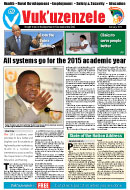Feb 2015
Feb 2015 Estelle GreeffAll systems go for the 2015 academic year
All systems go for the 2015 academic year Estelle GreeffThe 2015 academic year promises to be a better and brighter one for students at higher education institutions, thanks to a number of interventions announced by the Department of Higher Education and Training.
These initiatives are aimed at ensuring that higher education is more accessible to South Africans.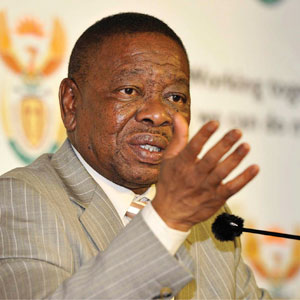
Minister of Higher Education and Training Blade Nzimande said this year the department would open a new university, increase funding for students, increase space at residences and offer more money to Historically Disadvantaged Institutions HDI.
A new HDI Development Grant of R410 million per year has been introduced from 2015/16 to help develop historically disadvantaged universities over a period of five years, he added.
NSFAS Allocation
The department has also set aside more than R6 billion in National Student Financial Aid Scheme (NSFAS) study loans for 2015.
Just over R4 billion will be allocated for university study loans and more than R2 billion for Technical and Vocational Training College bursaries.
“Despite massive increases in the NSFAS budget, the amount available still falls far short of the ever-increasing demand for student financial aid,” explained Minister Nzimande.
Student housing
The shortage of accommodation at universities has been a major problem with the shortage of beds estimated at 207 800 at the end of 2013. To deal with this challenge the department has set aside over R1 billion.
“For the 2012/13 to 2014/15 financial years we allocated R1,6 billion specifically earmarked for universities to build and refurbish student residences, with the bulk (R1,4 billion) of this being allocated to historically black institutions.
“This allocation, together with the R700 000 contribution from universities, will fund approximately 9 000 new beds for the system,” said the Minister.
New university
Last month, the University of Limpopo ceased to exist after the institution was demerged, giving birth to Sefako Makgatho Health Sciences University (SMU).
The SMU, which will incorporate the Medunsa campus of the former University of Limpopo, opened its doors to its first intake of just over 1 000 students this year.
“All continuing students of the former Medunsa campus will be registered as SMU students, and the university will therefore start it's life with a total enrolment of just over 5 000 students.
“This will be the first specialist comprehensive university in the country and will develop over the medium to long term into a university offering a wide range of health and allied sciences programmes from undergraduate certificates, diplomas and degrees, postgraduate certificates, honours, masters and doctoral programmes,” explained Minister Nzimande.
Upgrading Universities
This year, the two universities that opened in 2014 will also expand as their infrastructure is upgraded.
The University of Mpumalanga (UMP) and Sol Plaatje University (SPU) will get offices, laboratories, auditoria and information communication technology resource centres, among others.
“Work is continuing at both universities on the renovation, upgrading and extension of existing facilities to accommodate the planned enrolment for the 2015 academic year,” said Minister Nzimande.
The SPU will get 28 academic offices, six laboratories, five classrooms, a student admission centre, industrial kitchen and canteen. The work will also include the conversion of a ninestorey block of flats and two-storey building to accommodate 180 students.
At UMP, work will be done at the two campuses in Mbombela and Siyabuswa. At the Mbombela campus there will be two large auditoria, expansion and reconfiguration of a library, an information technology resource centre, computer laboratory and data centre.
The existing student residences will also be upgraded.
At the Siyabuswa campus the existing teaching facilities will be renovated, as well as one existing residence to expand the number of beds to accommodate the new intake.
The department will also offer help to those whose applications to institutions have been rejected and those who decide to further their studies at the last minute.
These prospective students can call the toll-free (0800 35 66 35) and can SMS their ID numbers to 49200 and officials from the department will assist.
State of the Nation Address
State of the Nation Address Estelle GreeffPresident Jacob Zuma will deliver his State of the Nation Address (SoNA) in Parliament in Cape Town on Thursday, 12 February at 7pm.
Every year, the President delivers the SoNA to outline government’s plans for the coming year and to acknowledge role players who contributed to the achievement of plans outlined in the previous year.
The event is usually attended by political dignitaries, senior government officials and South Africans from different walks of life. The SoNA is interpreted in the 11 official languages and Sign Language to make it accessible to all citizens.
With South Africa having celebrated 20 Years of Freedom in 2014, the President will focus on the progress made in this regard and highlight government’s priorities going forward.
Government’s priorities include improving education, improving health care, creating decent work, fighting crime and corruption, and rural development and land reform.
One of President Zuma’s responsibilities is to ensure that government implements the priorities through a Programme of Action with strong outcomes and measurable outputs in order to improve the lives of the people.
As usual, activities outside of Parliament before the SoNA will include different cultural groups entertaining spectators through song and dance.
The 2015 SoNA will be broadcast live on radio and television, and there will be live viewing on big screens at various locations in all nine provinces.
For more information visit: www.gov.za
Government geared to tackle challenges
Government geared to tackle challenges Estelle GreeffOn 12 February, Government geared to tackle challengesy, President Jacob Zuma will deliver his second State of the Nation Address (SoNA) for the current term of office.
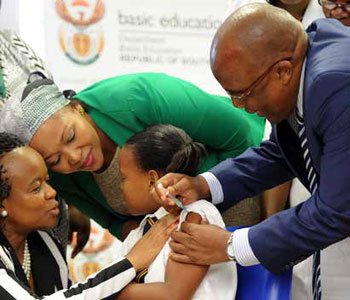 In his February 2014 SoNA, the President explained what government has done to improve the lives of all South Africans since 1994.
In his February 2014 SoNA, the President explained what government has done to improve the lives of all South Africans since 1994.
He later launched the Twenty Year Review that detailed government’s achievements in growing the economy and addressing challenges.
Several economic and social interventions had been put in place. These included the Reconstruction and Development Programme (RDP), which has given millions of South Africans access to social security programmes. Many people now have subsidised housing and services such as electricity and water, quality education and health care.
The review highlighted all the achievements but also noted there were still socio-economic challenges like unemployment. Statistics South Africa (Stats SA) says a quarter of South Africa’s 54 million people are unemployed.
During the February 2014 SoNA the President said government aimed to create six million job opportunities by 2019. To help create jobs, over the next five years, government will prioritise support to small business, and township and informal sector businesses.
Key interventions and targets
In his second SoNA of 2014, the President, in June, announced a number of initiatives aimed at bettering the lives of South Africans.
Among these was that a subcommittee on energy would be established to work on an “energy-mix” plan that would incorporate the current coalpowered stations with alternative means of power generation such as shale gas exploration and solar.
He also revealed plans to revitalise mining towns following challenges that mineworkers around the country had been experiencing.
The President also said it was important for the country to provide support to communities as well as to engage in food production and subsistence farming to promote food security, in line with the Fetsa Tlala food production programme.
To help the economy create jobs, he said that over the next five years, government would prioritise support to small business, and township and informal sector businesses in particular, and use the small, medium and micro enterprises (SMME) development programme to boost broad-based black economic empowerment.
As the President once again sets the course for the nation during his 2015 SoNA, significant progress has already been made on initiatives revealed in the June 2014 address.
Power Supply
SA started experiencing an intense shortage of power in 2014. Late in 2014 Cabinet adopted a five-point plan to deal with electricity challenges. Minister in the Presidency for Performance, Planning, Monitoring and Evaluation Jeff Radebe announced that government was implementing an energy mix. It includes coal, solar, wind, hydro, gas and nuclear energy to meet the country’s future needs.
Operation Phakisa
President Zuma officially launched phase one of Operation Phakisa - a new initiative to accelerate economic transformation - in Durban in October. Phase one focuses on the ocean economy.
The word “Phakisa” means “accelerate” or “hurry up” in Sesotho.
The programme’s four priority areas include marine transport and manufacturing, offshore oil and gas exploration, aquaculture as well as marine protection services and ocean governance.
Operation Phakisa is in-line with the goals to grow the economy and create jobs outlined by the National Development Plan (NDP).
In November, the President launched Operation Phakisa phase two to transform all public sector clinics to provide quality healthcare. The second phase of the programme is aimed at improving the quality of care provided in 3 500 Primary Health Care facilities, which consist of government clinics and Community Health Centres.
Rural development
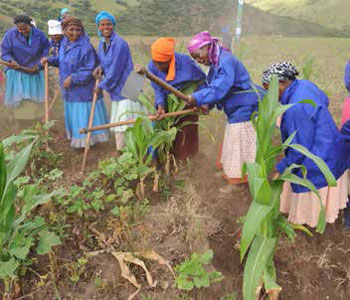 Rural Development and Land Reform Minister Gugile Nkwinti said last year that government had helped 3 159 youths find employment by the end of March. About 5 335 youth including those registered under the National Rural Youth Service Corps (NARYSEC) were enrolled in skills development programmes.
Rural Development and Land Reform Minister Gugile Nkwinti said last year that government had helped 3 159 youths find employment by the end of March. About 5 335 youth including those registered under the National Rural Youth Service Corps (NARYSEC) were enrolled in skills development programmes.
A hundred learners have been recruited for mentoring on the environmental practice learnership programme and 386 enterprises and industries were supported through rural development, agriculture and tourism initiatives.
Revitalising mining towns
Government plans to revitalise mining towns where mine workers experience poor living and working conditions.
When President Zuma announced the appointment of five Inter-Ministerial Committees (IMCs) last year, he said one of them would look at mining towns.
The IMC, chaired by Minister Radebe, had to implement the Special Presidential Package in 14 distressed mining towns across North West, Mpumalanga, Gauteng, Northern Cape, Limpopo and Free State.
By December 2014 government had set aside R2.1 billion to fund housing project implementation in mining towns in North West – Rustenburg, Madibeng and Moses Kotane – over the next three years.
An amount of R290 million has been approved for the Department of Human Settlements project to upgrade informal settlements for 2014/15.
The Health Department has been allocated R500 million for TB screening for current and former mineworkers and community members.
SoNA 2015: People’s expectations
SoNA 2015: People’s expectations Estelle GreeffAs South Africans eagerly await President Jacob Zuma to deliver his State of the Nations Address (SoNA) on 12 Frebruary, Vuk’uzenzele caught up with a few of our readers to find out what it is that they hope the President will focus on this year.
 Duduzile Ndlovu
Duduzile Ndlovu
Gender: Female
Age: 52
Location : KwaZulu-Natal
My expectation is for the President to announce an increase to the number of Thuthuzela centres in the country. This is the best thing the government can do because these centres provide people with a place where they can go and report abuse and receive the best professional help.
 Lesiba Motena
Lesiba Motena
Gender: Male
Age: 32
Location : Limpopo
I am personally expecting the President to highlight whether state hospitals are ready to deal with Ebola should there be an outbreak in South Africa. Secondly I would like the President to highlight government’s future plans in relation to the e-toll system.
 Xolile Ndlovu
Xolile Ndlovu
Gender: Female
Age: 24
Location : Kabokweni, Nelspruit
The President should give more bursaries to the children in the rural areas, some pass with flying colours but they end up sitting at home doing nothing. I believe that if the children in rural areas are provided with relevant information then they will prosper. I also think that the President should focus on the issue of teenage pregnancy. I think if there were people visiting schools in the rural areas to motivate the learners more of those learners will be encouraged to improve their lives and better their communities.
 Naomi du Plessis
Naomi du Plessis
Gender: Female
Age: 53
Location : Gauteng
I would like the SoNA to focus on education because education forms the backbone of any society. South Africa needs to strengthen the education system so that we can be competitive with the rest of the world. The President must also talk about the country’s energy sector and the plans that are there to make it more stable.
 Angus Opperman
Angus Opperman
Gender: Male
Age: 22
Location : Western Cape
I would like to see higher passing mark requirements, a bible session each day and a full sporting period. I also think homework should be kept to a minimum as children and all human beings need to lead a balanced and not a one sided lifestyle.
2015: A year for greater positive change for SA
2015: A year for greater positive change for SA Estelle GreeffAs Vuk’uzenzele returns to our homes and streets at the start of a new year, I am pleased to extend, on behalf of government and my family, my best wishes to all our readers for 2015.
As a nation, we can be proud of the many achievements we recorded during 2014, including the fact that we have produced another generation of young South Africans who have completed secondary education and are geared for further education and training, or the world of work.
However given the economic climate, there will be many young people who will face difficulty with regard to finding employment or other challenges in their lives while their families, communities and government do all we can to support them. However, those young people and those supporting them should never give up hope or stop giving and sharing. Ours is an economy and a society where we should never lose hope or, as a songwriter once said, let hope lose us.
When we hope in South Africa, we are not doing so in vain.
Our National Development Plan is a plan for dealing with unemployment, inequality and poverty. It is a plan that is rooted in the Freedom Charter that lives on in our Constitution today, 60 years since the Charter was adopted at a Congress of the People in Kliptown, Soweto.
Inspired by the Freedom Charter of 1955, we have, as democratic administrations since 1994, taken various bold steps to move South Africa forward.
As a result, the overwhelming majority of our people live in conditions which are vastly different from what it was, even 10 years ago.
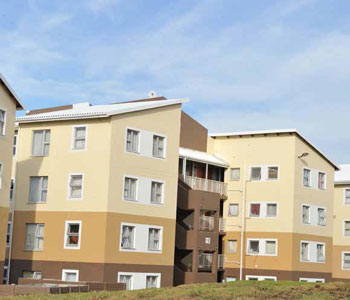 More people have access to housing and better and more equal access to basic services. More households have been electrified; healthcare and education has improved, and economic opportunities have been opened to the people.
More people have access to housing and better and more equal access to basic services. More households have been electrified; healthcare and education has improved, and economic opportunities have been opened to the people.
We have invested in public transport to make sure that people can move between home and places of work more freely and safely.
We are supporting farmers, big and small, and are taking steps to ensure that people return to land from which they were forced or barred under apartheid.
Government has restored nearly 3,2 million hectares of land to South Africans and paid out more than R18 billion between 1995 and November 2014 to people who chose financial compensation instead. In this process, nearly 1,8 million people have benefited.
These achievements show what is possible if we all work together to move our country forward.
These achievements inspire us to do more and they inspire us to focus on the good that is being created in our country every day, even though headlines and talk shows would like us to believe differently.
As President, I am looking forward to 2015 as a year for even greater positive change in our country. On Thursday, February 12, I will deliver the State of the Nation Address which will set out how our country’s leadership and I see South Africa moving forward in this year.
The State of the Nation Address is an opportunity for all South Africans to learn first-hand how we view the current state of the country and how we plan to deal with the challenges that face us.
The State of the Nation Address gives all South Africans a chance not just to learn what government is planning, but to think about what each of us can do to make South Africa an even better place.
The Address to Parliament is an occasion on which we express our nation’s diversity and unity as people from all walks of life, political backgrounds and social and economic sectors come together to focus on those things we need to do as a nation to create opportunity for all South Africans and to build a united nation.
I look forward to the State of the Nation Address as an occasion that gets the nation talking and thinking about the things that are truly important to the majority of us – especially those of us who are committed to building a better future and a better life in our own country and in our region, continent and the world.
Mostly, I look forward to the Address as an occasion for the nation to take action that will change our country. 2015 is a year for unity in action to secure economic freedom for the majority of South Africans.
2015 is a year for stepping up our efforts to improve the lives of the poorest South Africans and turning into reality the many rights our Constitution affirms for citizens.
2015 is a year for lifting people out of poverty and adding to the thousands of opportunities that exist today and which apartheid denied most us for decades.
2015 should be a year during which all of us work daily and work hard to realise our shared vision of a non-racial, non-sexist and prosperous South Africa.
As positive-minded South Africans, we should in 2015 drown out the voices of cynicism and complaint that ridicule our achievements and that wish failure and disaster upon us.
As a government of the people, we will always work in the best interest of the nation, consulting people on their needs and their solutions to address those needs.
We will work with those in the private and community sectors who are committed to a better South Africa and we will humbly address mistakes we may make along the way.
I look forward to 2015 as a year in which I will visit many communities and projects to address challenges facing us and to celebrate initiatives by government, the private sector and communities to build the South Africa our Constitution calls for.
Our national call to action, Together We Move South Africa Forward, speaks of unity in action. It speaks of partnership and sharing of ideas and resources. And it suggests that we never stand still; that we are always on the move, facing in the right direction.
As we face the future, 2015 also reminds us of many important milestones in our history and development as a nation, from the Congress of the People in 1955, to the Sharpeville Massacre 55 years ago and the Trojan Horse Massacre in Athlone, Cape Town, in 1985.
There are many others that remind us of the high price paid by previous generations to secure the free and democratic South Africa in which we live today.
Let us honour our heritage by investing our best will and energy into the future.
Centralised IT system to improve health
Centralised IT system to improve health Estelle GreeffSlovoville Clinic, situated in Johannesburg, has become the first health facility to introduce an electronic health information system that will make the lives of patients and staff at the clinic easier.
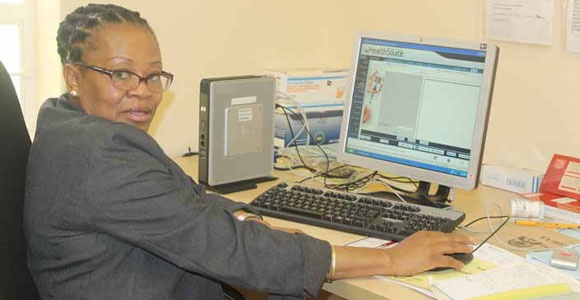 Systems such as these are in line with recommendations made by the National Development Plan (NDP), which states that there is a need for a national health information system which integrates provincial, district, and communitybased information systems. The NDP is a plan for the country that seeks to eliminate poverty and reduce inequality by 2030.
Systems such as these are in line with recommendations made by the National Development Plan (NDP), which states that there is a need for a national health information system which integrates provincial, district, and communitybased information systems. The NDP is a plan for the country that seeks to eliminate poverty and reduce inequality by 2030.
Elisa Munzhelele, 57, suffers from hypertension. She has to visit the Slovoville Clinic to collect her medication that helps control her illness.
When Munzhelele goes to the clinic to fetch her medication, all the nurses need from her is her fingerprint, which activates her medical history electronically on an electronic system known as theHealthSource (tHS).
The tHS system is being piloted at the clinic by the City of Johannesburg in partnership with Anglo American.
Munzhelele says what she has noticed since the system was introduced at the clinic is the reduced waiting times.
“I used to have to bring my card to the clinic that has all my information on it but sometimes I would misplace this card and I would have to be given a new card for my visit.
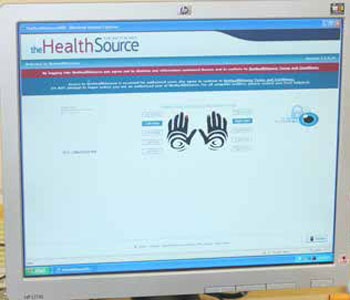 “With this new electronic system, all the nurses need is my fingerprint which I place on the computer and all my details pop up. They can track what medication they gave me on my last visit and also see when I’m due to come back to the clinic,” says Munzhelele.
“With this new electronic system, all the nurses need is my fingerprint which I place on the computer and all my details pop up. They can track what medication they gave me on my last visit and also see when I’m due to come back to the clinic,” says Munzhelele.
Mayor of the City of Johannesburg Parks Tau launched the tHS in partnership with AngloAmerican in September 2014.
The aim is to eventually roll out this system across all clinics in the City once the pilot is completed.
The tHS is a web-based electronic health record system produced in 2007 for clinics belonging to the mining company AngloAmerican.
It creates a single medical record for patients, which becomes complete as health care providers add to the record.
“It allows patients to consult anywhere where there is a tHS system irrespective of whether the health care provider is a public, private, non-governmental or mining company,” said Director of Integrated Health Policy, Planning and Research Unit within the City of Johannesburg, Bheki Sibeko.
Health workers are able to capture information on the patients while working on the system, ensuring accuracy of critical data. The system can also track the patients' history.
The system is secure and the data or information that is loaded onto the system is confidential.
The tHs prevents duplication of medical tests; it also ensures that the patient gets the correct tests at the right time to help improve medical conditions.
Sister Naomi Mogwane, who oversees the running of the clinic, added that at times one patient would have five cards because there was no system for tracking patient medical records, which the tHs has improved.
The NDP states that systems such as these should link to secure online electronic patient records and other data structures, such as financial, pharmacy, laboratory and supply chain management databases.
How to choose medical care
How to choose medical care Estelle GreeffPrivate medical care can be expensive and choosing the right medical scheme for yourself and your family is not easy.
There are more than 8,7 million people who are medical scheme members while many more intend to join the 87 registered schemes in the country. People join medical schemes because they want security for both chronic and unplanned medical incidents that may need specialist care, often running into thousands of rands.
According to Daniel Lehutjo, Acting Chief Executive Officer and Registrar of the Council for Medical Schemes (CMS), there is a perception that medical scheme premiums are expensive and unaffordable for ordinary people.
“The reality is that many of the 24 open schemes currently do have affordable entrylevel plans that cater for the so called ordinary people. Several thousand petrol attendants, food workers and farm workers enjoy medical cover through medical schemes thereby proving that basic medical care is not out of reach for many people as they might think.”
The CMS came into existence through the Medical Schemes Act, 1998 (Act 131 of 1998), to protect medical scheme members. The CMS’s mandate is to regulate the medical schemes industry and ensure that people receive fair and equal access to medical care. The CMS has to inform people about their rights and solve disputes related to medical schemes for free.
“It is important to choose the right medical scheme not only based on price but by doing research to ensure that the scheme meets the needs of you and your family,” said Lehutjo.
Choosing a medical scheme
This advice can be used by potential and current members of medical schemes who have the option of selecting a different benefit option at the end of each year. Here are a few tips:
- Identify a few schemes and ask for information about their benefits, contributions, limitations and exclusions.
- Compare the advantages to determine which one meets your needs.
- Besides the health care benefits also find out what the scheme’s reserves are (solvency ratio), and non-health care costs such as administration costs, to ensure they are in good financial health.
- Understand what prescribed minimum benefits (PMBs) are and under what circumstances the chosen scheme provides such cover for you.
“Here you can look at designated service providers and their proximity to you as well as other networks that provide benefits to members,” said Lehutjo.
He added that people should ensure that the scheme they are considering is duly registered in terms of the Medical Schemes Act of 1998. The names, addresses and telephone numbers of all registered schemes are published on the CMS website. The list is also published annually in the Government Gazette for general information. The Office of the Registrar will also provide you with information on registered schemes such as their financial statements, etc.
Current medical scheme members
If you are already a member of a scheme, read all the material such as options to change plans. Ensure that you understand how the benefit options operate and choose according to your health care needs and what you can afford. The registered rules of medical schemes fully disclose detailed information regarding the relevant benefits and contributions. It is essential that you obtain the rules of the scheme or a summary of the rules to verify all information relevant to enable you to make an informed choice.
“Some people choose to make use of an agent or broker. Remember it is not compulsory to use a broker, but if you do ensure that he/she has been accredited by the CMS and that your selection of a scheme is based on informed consent,” Lehutjo said.
For more information on how to choose a medical scheme, PMBs, rights of scheme members and the complaints procedure, call 0861 123 267 or visit www.medicalschemes.com or email information@medicalschemes.com
Basic Education: Working towards excellence
Basic Education: Working towards excellence Estelle GreeffThe Minister of Basic Education Angie Motshekga says the implementation of the Curriculum and Assessment Policy Statement (CAPS) has raised the bar and brought quality and efficiency into the education system.
CAPS replaced Outcomes-based Education (OBE). In 2014, the class of 2014 wrote the CAPS-aligned examination for the first time and achieved a pass rate of 75.8 per cent. The CAPS curriculum was phased in during 2012 (Grade 10), 2013 (Grade 11) and 2014 (Grade 12).
Motshekga is confident that CAPS is a game changer.
“What gives me great hope and confidence is that prominent educationists in the country reviewed the pass requirements and they agreed that we should keep the curriculum for at least 10 years.”
Her deputy Enver Surty agrees with her. “The CAPS examination results tell us that there are huge systemic changes taking place. Not one district across the country performed under 50 per cent.
A quality curriculum, despite rollout challenges Like many other new systems, the CAPS rollout, had its challenges.
“Despite this, I am confident that we are on a good trajectory as we move forward as a country,” says Motshekga.
She explains that independent and credible South Africans have assessed the system.
“So when we say it’s a quality curriculum, we are being honest. It’s the same with the exam papers, they are set and moderated externally,” she says.
She also stressed that the implementation of national plans and policies must take place on the ground in each province.
“Success comes from inside each school. Those that have good improvement plans and get their teachers, learners and parents involved will succeed,” she says.
The migration challenge
Another challenge highlighted was that of people migrating to provinces that historically have better resources, more highly skilled educators and a higher pass rate.
“Urbanisation is a reality that we have to deal with and socio-economic conditions affect learners. In the Eastern Cape, for example, if we look at the deep rural areas, it’s not only hard to teach there, it’s hard to reach there,” said Surty.
Despite these challenges, a positive outcome from the class of 2014’s examination results is the number of distinctions obtained from Quintile 1, 2 and 3 schools when compared to those from Quintile 4 and 5 schools in the past.
The Quintile system is the classification of schools according to economic profiles of communities. Quintile 5 schools are schools based in more affluent communities, where parents can afford to pay for fees and books and are able to support the system via forming governing bodies. Quintile 1 schools are located within the poorest and deep rural communities where parents cannot afford to pay school fees.
“The distinction results from the lower Quintile schools means that we are contributing positively and meaningfully. We have not yet bridged the gap, but we have narrowed the gap between the deep rural and the urban, between the poorer community schools and the more affluent,” he added.
Provincial pass rates
In terms of the class of 2014’s pass rate, five provinces showed a decline and four showed an increase.
Gauteng took top honours with a pass rate of 84.7 per cent, which is slightly lower than its 2013 pass rate. Gauteng was followed by the North West (84.6 per cent); Free State (82.8 per cent); Western Cape (82.2 per cent); Mpumalanga (79 per cent); Northern Cape (76.4 per cent); Limpopo (72.9 per cent); KwaZulu- Natal (69.7 per cent) and the Eastern Cape (65.4 per cent).
Three of the top districts are located in Gauteng, whilst the fourth is shared with the Western Cape.
Raising the bar
Motshekga emphasises, “We cannot postpone the importance of raising the bar in the basic education sector. The journey has commenced in earnest.”
The Council for Quality Assurance in General and Further Education and Training, uMalusi, which plays a critical role in protecting the integrity of the NSC examination has, after rigorous verification of all examination processes, declared the 2014 NSC examinations as free, fair and credible.
This achievement is attributed to the unwavering commitment demonstrated by examination officials at the department, across the nine provinces.
“The benefits of CAPS in the long-term will out-live our generation of leaders and managers in the sector. We have learnt from this process which will propel us to greater heights when it comes to improving learning outcomes,” Motshekga concludes.
Hard work pays off for top achievers
Hard work pays off for top achievers Estelle GreeffHard work, dedication and discipline were the ingredients of success for these top performing learners.
Rashmika Deeplal, a top learner in quintile four (fee paying) schools, was one of the 23 students invited to attend the 2014 matric results announcement by Basic Education 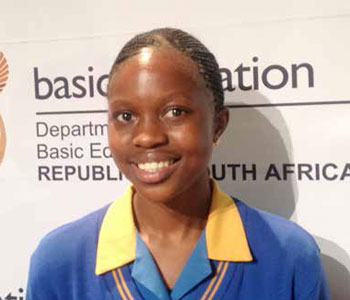 Minister Angie Motshekga in Johannesburg, Gauteng last month. The class of 2014 achieved a 75.8 per cent pass rate.
Minister Angie Motshekga in Johannesburg, Gauteng last month. The class of 2014 achieved a 75.8 per cent pass rate.
Deeplal, from Isiphingo Secondary School in KwaZulu Natal, told Vuk’uzenzele that her achievement came as a surprise to her and that it made her feel very happy that all her hard work has finally paid off.
“It makes me feel appreciative of all the support that my siblings, parents and teachers have given me,” she said.
She said at some stage she felt doubtful but what helped her was remembering her goals.
“It does not matter what you feel, as long as you know you have done your best,” she said.
Deeplal encouraged the class of 2015 to be consistent with their studying and start working hard from day one.
She said she is looking forward to studying medicine at the Nelson R. Mandela School of Medicine in KwaZulu-Natal.
Another top achiever was Masindi Mphephu of Thohoyandou Secondary School. She came in third in quintile three (no-fee) schools. Mphephu said her parents bought a lot of books that helped her to achieve the sterling results.
“It has been very hard… I attribute my achievement to hard work and the support from my parents. My mother would sit with me through the nights and make sure that I studied all the important subjects,” she said.
Mphephu, who has two siblings, will be studying towards a Bachelor of Accounting Science at the University of Witwatersrand this year.
In total, there were 23 top achievers from the 2014 Grade 12 class and all of them received various gifts from various sponsors who were present at the matric results announcement.
Gauteng had the majority of top achievers in all the categories.
Minister Motshekga said the quality of education of any system is predicated on the quality of its teachers.
She said the qualification profile of teachers in the sector has improved from 53 per cent in 1990 to 97 per cent in 2013.
“The President has been making a call to make education a societal issue and school governing bodies part of the key role-players.
“Going forward, we will work hard to sustain improvement in learner performance, enhanced accountability at all levels of the system, greater focus on basic functionality of schools, and protecting time for teaching and learning,” the Minister said.
The department will also improve monitoring and support for teaching and learning.
Information, advice offered for career development
Information, advice offered for career development Estelle GreeffThe Department of Higher Education and Training (DHET) will now offer Career Development Services (CDS) to young and old people entering post-school education and training.
People can now approach the department directly about career development. The CDS provides information, guidance and advice to help people choose a career that is in line with their development and the prosperity of the country.
“Our approach is to nurture their individual competence within their chosen field of interest, regardless of their circumstance. The goal is to ensure that through these career development services, people have access to information that will help them through their lives,” says Deputy Director in the DHET, Xola Mpengesi.
The CDS includes a multi-platform information service, guidance and counselling service comprising a range of services from face-to-face to online services.
Targeting rural areas
The CDS, which will be provided in partnership with different stakeholders, will target pupils in rural areas.
“The department also offers training and support services through proactive engagements with learners, teachers, students and lecturers across the board, especially in rural communities”.
The department is working closely with Technical Vocational Education and Training colleges, labour centres and correctional facilities in providing a coordinated service to the public.
The services further include outreach programmes through the Apply Now! and “Take 5” campaigns. The Apply Now! campaign targets learners from Grade 9 to Grade 12 and aims to create awareness of the range of post school education and training opportunities available and the importance to apply on time for admission into those programmes.
The “Take 5” initiative targets government officials, their families and friends. Five career development information cards are distributed to an official to share with family and friends. The information on the cards includes the CDS helpline contact information. Government officials are encouraged to spread the information on CDS offered by the department.
Central Applications Clearing House
The DHET also provides a Central Applications Clearing House (CACH) service to assist prospective students in late applications to post-school education and training opportunities. It also offers free career advice where needed. The CACH service can be reached by calling 0800 356 635 or sending an SMS with the name and identity number to 49200 of the prospective student and someone from the department will call back. A prospective student can also record his/her own information directly by going to cach.dhet.gov.za.
Visually impaired farmers feed society, create jobs
Visually impaired farmers feed society, create jobs Estelle GreeffVisually impaired elderly citizens in Ga-Rankuwa, north of Pretoria, are planting vegetables to alleviate poverty and create jobs.
Joyce Sibeko, 68, is the founder and chairperson of Ikemiseng Association for the Blind in the area. Her farming association specialises in planting and growing vegetables such as spinach, carrots, beetroot and onions.
Her agricultural project dates back to 1995, when she joined forces with her fellow visually impaired neighbours.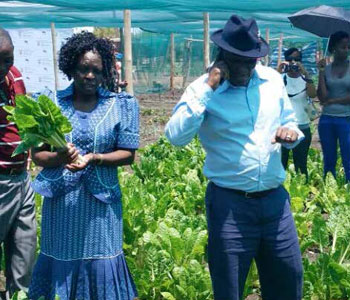
“I started this project because I had realised that many blind people did not have sufficient food in their homes here in Zone 2 [Ga-Rankuwa]. Houses in this area were built for blind people,” said Sibeko.
She then went on a door-to-door visit, asking neighbours to join her in planting vegetables in their backyards so that they could put food on the table.
In 2002, she and her counterparts successfully applied to the Department of Rural Development and Land Reform for land for farming, and they have not looked back since. They were given 18 hectares.
“We also ventured into a bakery and detergents business but we had to stop due to lack of funds,” she added.
Sibeko said their efforts received a great boost when department provided them with funding in 2013.
Sibeko said Ikemiseng Association for the Blind still has a few challenges, including insufficient resources required to grow the project.
“We have trees and stems that need to be rooted out of our garden. We are only using two hectares out of 18 hectares of our land. We also had to retrench some of our workers because we could not afford to pay them,” said Sibeko.
The farmers use a generator to draw water from a nearby river to water their vegetables.
A chance to grow
Sibeko’s grandson, Phumelele Zimbaye, 23, said Ikemiseng was likely to expand and create more jobs for the benefit of visually impaired people and the sighted.
“When looking at the business side of the association, I see a lot of growth. Imagine once we start using the entire 18 hectares and get introduced in the market, we will be able to supply our vegetables everywhere,” Zimbaye said.
Currently, Ikemiseng only supplies vegetables to customers in Ga-Rankuwa and Mabopane, also north of Pretoria.
Zimbaye said a total of 12 visually impaired people who started the project (including his grandmother), were still part of it and they received a lot of support from the community.
“Some people volunteer to work in the project. We have about six community members who are not visually impaired, who are handson at the project,” he said.
Rachael Kgatjepe and Dorris Ngwako, Ikemiseng members who are not visually impaired, were sitting outside the vegetable garden with bunches of spinach on sale. They said business was good. At times, the association donates vegetables where needed and also supplies to pre-schools and at funerals.
Zimbaye said about 25 people, including volunteers, are involved in the project. Ikemiseng also has youth on the waiting list, who want to be part of the project.
“We want to start a programme where we will provide [young people] with skills development in terms of agriculture. We want to partner with the school for the blind (located near Ikemiseng’s garden),” he said.
Private sector support
When Deputy Minister of Agriculture, Forestry and Fisheries, Bheki Cele, visited Ikemiseng Association for the Blind, he was amazed by the work they do.
“The Department of Agriculture is mandated to create… jobs and bring on young people and people with disabilities. This is a start. Several government departments should come on board with regards to this project. It is an initiative that will have to be supported,” said the Deputy Minister.
He also called on the private sector and community members to show their support.
“With 18 hectares, they can be self-sufficient and sustainable. They can even be rich from this, if they maximise land use,” he said.
The Deputy Minister said he would also request the Department of Social Development to support Ikemiseng by buying vegetables from the association when packaging food parcels for the needy.
Deputy Minister Cele said out of 12 colleges and six universities that provide agriculturerelated studies in the country, government should liaise with institutions to ensure that they devise special programmes to accommodate more visually and hearing impaired students who are interested in farming.
He said government would continue to support such initiatives, where community members make the effort to fight poverty and unemployment.
Transforming KZN’s rural landscape
Transforming KZN’s rural landscape Estelle GreeffThe lives of residents of uMsinga will be changed for the better with the recent launch of the rural infrastructure projects that are expected to develop, create jobs and bring investment to the community.
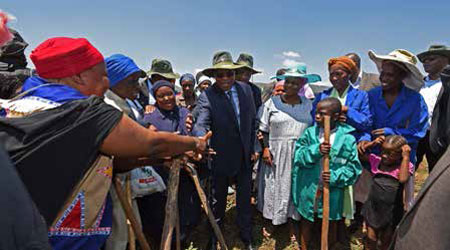 UMsinga, which is about 250 kilometres from Durban, is predominately rural with little economic activity.
UMsinga, which is about 250 kilometres from Durban, is predominately rural with little economic activity.
President Jacob Zuma recently launched rural infrastructure projects worth R70 million which form part of government’s Comprehensive Rural Development Programme (CRDP), that aims to tackle issues such as underdevelopment, food security, unemployment, poverty, lack of basic services and other social ills, which have become synonymous with rural areas.
The President, accompanied by Rural Development and Land Reform Minister Gugile Nkwinti and KwaZulu-Natal Premier Senzo Mchunu, visited the Tugela Ferry Irrigation Scheme, an initiative that aims to help smallholder farmers and create job opportunities for the community.
He also held a sod turning ceremony for the 170 metre Mashunka and Ngubo Bridge and handed over an animal sale yard to the uMsinga Livestock Association.
President Zuma said rural development was one of government’s five key priorities.
“This means that greater focus and emphasis is being placed on the development of rural communities with the aim of improving the quality of life of our people, increasing access to basic services and creating jobs and job opportunities.
“Rural economy transformation requires us to bring resources to rural areas, such as water, electricity, improved infrastructure and economic opportunities in order to enable rural communities to take charge of their own economic development,” he said.
The President said over R2 billion had been invested in the past five years towards improving basic human needs, developing rural enterprises, and providing socio-economic infrastructure.
The refurbishment of the Tugela Ferry Irrigation Scheme is one of five prioritised schemes comprising 726 hectares of irrigated land along the Tugela River at Tugela Ferry in the Msinga Local Municipality located in the Umzinyathi District.
The scheme has been divided into plots that have been allocated for vegetable production, to improve food security, but also for the sale of surplus produce.
The President said more than 1 000 smallholder farmers have benefited through the scheme and 2 000 seasonal farm worker jobs will be created when the scheme is operating optimally. A total of 290 jobs were created during its construction.
Phase one of the project was completed last year. It included the refurbishment of the infrastructure, repairs to the weirs intake, repairs to the concrete canal, lining of the existing earth dams, upgrading the infield irrigation system, upgrading three pump stations and the construction of a new pump station.
“Good progress has been made toward the conclusion of the second phase, which includes the upgrading of two additional pump stations,” said the President of the R39 million project.
Government is further planning to build a bridge over the Tugela River to link the communities of Mashunka and Ngubo. President Zuma said preliminary designs for the bridge have been completed.
The project is expected to cost R55 million, including R30 million for the construction of the bridge to be funded by the Department of Rural Development and Land Reform while the KwaZulu-Natal Department of Transport will fund the access road and design costs estimated at R25 million.
“It will bring much needed relief and social benefit to the community of Mashunka. In addition to this, the new bridge will provide those engaged in farming activities easier access to markets by ensuring more efficient transportation to take their produce to markets.”
The construction of a road will also generate 200 jobs.
The Department of Rural Development and Land Reform, together with the local livestock association, spearheaded the building of a permanent animal sale yard.
The construction of the R1,9 million facility was handed over to the Msinga Livestock Association.
President Zuma said people in rural areas deserve a better quality of life.
“Through the implementation of the Comprehensive Rural Development Programme, we are beginning to see a transformation of the rural landscape of our country and an improvement in the livelihoods of rural communities.”
Cooperative changes lives in Limpopo
Cooperative changes lives in Limpopo Estelle GreeffBettah Tarea’s idea to start a cooperative in her community some six years ago is proving fruitful.
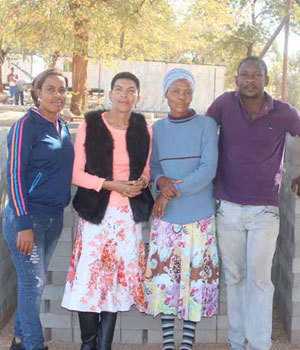 Aganang Brickmaking Cooperative was registered in 2008 and is run by four women and a man in Thabazimbi, Limpopo. Over the years it has helped create jobs in the community.
Aganang Brickmaking Cooperative was registered in 2008 and is run by four women and a man in Thabazimbi, Limpopo. Over the years it has helped create jobs in the community.
As a manager of the cooperative, Tarea has taught other cooperative members the skills she acquired while working at Bophelong Project, and the cooperative continues to grow from strength to strength.
“Starting the cooperative was not easy because we had no funding and we had to use money from our own pockets for material,” said Tarea.
Aganang Brickmaking Cooperative started by using land belonging to the municipality.
Josephine Sekgwatlhe, a member of the cooperative, said since the municipality granted approval to use the land, their business started to grow.
The Limpopo Economic Development Agency (Leda) supplied the cooperative with an Iveco vehicle for transportation and one moulding maxi-brick machine.
Leda also provided the team with business management workshops and business cards.
“It did not end there. More people were impressed with the work done here at Aganang and help kept coming from every direction,” said Tarea.
The Department of Trade and Industry (dti) also came on board and bought a truck for the cooperative worth R300 000.
Grace Taree, also a member of the cooperative, said the truck is used for delivery purposes and collecting materials.
The cooperative also received help from private companies. Rhino Minerals provided material and resources, and Kumba Iron Ore sponsored material and resources to help accelerate production and grow the business. In 2010 Anglo American gave Aganang Brickmaking Cooperative a contract to build a road in Thabazimbi.
Today the cooperative employs five permanent and four part-time workers.
The cooperative produces up to 5 000 paving bricks and 3 000 to 4 000 maxi bricks daily.
“When the machines are all connected with the same moulding tray they can produce close to 17 000 bricks daily,” said Tarea.
Tshepo Gabolelwe (29) started working at Aganang Brickmaking Cooperative in 2009.
“Working here is nice as I feel free and enjoy what I am doing,” said Tshepo.
The cooperative is a good example of how government and a dedicated group of people can work to change the lives of community members.
The dti spokesperson Sidwell Medupe said the department prided itself on having supported the Aganang Brickmaking Cooperative.
“The department has spent millions [of rand] through the Cooperatives Incentive Scheme to help members of cooperatives grow their enterprises by increasing their production, competitiveness and quality of their products and services,” he said.
He mentioned that future plans for the cooperative included owning their own land, having bigger offices and storage, and supplying to well-known companies.
Protecting the victims of sexual abuse
Protecting the victims of sexual abuse Estelle GreeffTo be able to investigate rape cases, most would agree that you should have skin as tough as a rhino’s.
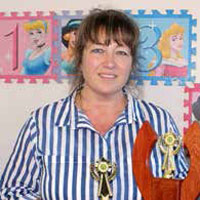 Investigating rape cases for a living is not for the faint hearted. But Warrant Officer Rene Nel, who is one of the country’s leading detectives, says someone has to ensure that victims of rape get the justice they deserve.
Investigating rape cases for a living is not for the faint hearted. But Warrant Officer Rene Nel, who is one of the country’s leading detectives, says someone has to ensure that victims of rape get the justice they deserve.
Nel was recently presented with the Best Provincial and National Investigator Award for her success in investigating crimes against women and children. This relates to cases she dealt with while at the Family, Child Protection, and Sexual Offences (FCS) Unit in 2013.
She was also crowned the Best Detective in the Free State for the 2013/14 financial year.
Based at the Bethlehem FCS Unit in the Free State, she says the best part of her job is when she makes an arrest and gets to tell the victims that the perpetrators are going to jail for the crime they have committed.
“There is no better feeling in the world than when a case has been closed and the wrongdoers get the sentence they deserve.”
Nel made headlines when she successfully investigated three different cases of serial rapists which resulted in 13 life sentences for rapes of women and children in 2013.
“I put myself mentally on the crime scene and it also helps immensely to build and maintain a good relationship with the victims and their loved ones. Even when a case has been concluded, victims always keep me informed of how they are doing and coping with their ordeal when we meet in town, for example.”
Nel worked for the South African Police Service (SAPS) for 23 years, says getting the award was wonderful - but she was just doing her job.
“I have been a detective for 15 years. I am not used to the attention I have since been receiving.”
Along with a trophy, Nel also received an iPad for her outstanding performance.
She says even though she appreciates the recognition, working with rape cases is not easy.
“With cases like murder there is a funeral that makes everything final. When a person is raped, every day they are confronted with humiliation and that’s emotional.
“As the detective, you need to be a rock for the victims because you are there throughout the investigation process. You get emotionally drained. I sometimes cry with my victims because I am human too.”
Dealing with perpetrators
Her job has made her extra cautious.
“I am more aware of my surroundings which keeps me alert at all times.”
After dealing with perpetrators of rape, one thing that she has noticed is that people have lost respect for themselves.
“If you don’t respect yourself, how will you respect the females and children next to you? Some of the perpetrators see rape as having power over a person by forcing power over them. I think the key thing, though, is respect for themselves.”
“When I talk to the perpetrators, some of them do not feel guilty, others are shy and remorseful and others do not show any emotion – those are the worst.”
She adds that there was a habit among young people of misusing the word rape.
“For example a young woman would come home late after a night of drinking with her boyfriend and the next morning the easiest thing to tell her parents is that they were raped on their way home just to stay out of parental trouble.
“People like this make me angry because they waste the time of police officers when we could be working on more serious cases. Another thing is that when a victim comes in and says they have been raped and I can tell if there are loopholes in the case but I cannot judge them unless I have all the evidence and look at all angles of the case.”
She said with regards to child abuse, it was very important that parents know exactly where their children are at all times.
Nel believes the government is doing a lot in terms of educating people about sexual violence.
“It’s up to the community to use this information, government can only do so much.”
Nel, nicknamed Mathabo (which means woman of happiness in Setswana) in honour of her bubbly and strong personality, says after so many years of serving, she is grateful for the recognition.
Justice reaches the people
Justice reaches the people Estelle GreeffSmall Claims Courts are instrumental in ensuring that an accessible and user-friendly justice system is a reality to people.
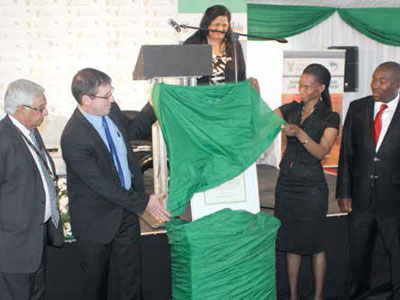 This was according to the Deputy Minister of Justice and Constitutional Development, John Jeffery, when launching the Khayelitsha Small Claims Court, in Cape Town.
This was according to the Deputy Minister of Justice and Constitutional Development, John Jeffery, when launching the Khayelitsha Small Claims Court, in Cape Town.
Small Claims Courts are used to settle minor civil disputes and claims between parties without representation by an attorney, in an informal manner.
An amount not exceeding R15 000 can be claimed at the Small Claims Court. Before 2010, Small Claims Courts could only deal with cases involving small civil claims of R7 000 and below.
The jurisdiction of these courts was further increased to R15 000 which was gazetted on 1 April 2014.
“The Small Claims Courts are an important component of the programme of the Department of Justice and Constitutional Development.
“They are front line courts because they are at the [centre] of our people’s needs for an accessible, user-friendly justice system,” he said.
The Deputy Minister said the department aimed to have such courts open in every magisterial district around the country in a bid to take service delivery to the doorstep of all South Africans.
He told Khayelitsha and other Western Cape residents, who attended the launch, that out of the 23 courts that had already been established, eight were in the province.
“The Western Cape has 44 magisterial districts and we currently have 35 Small Claims Courts in the Western Cape with six additional places of sitting.
“So this means that we have now got 93 per cent of coverage in the Western Cape and in order to be 100 per cent compliant, we need to establish nine new Small Claims Courts.”
He said in 1994 there were only 120 Small Claims Courts nationwide, but they were mostly in former white areas.
Currently there were 316 Small Claims Courts across the country and, according to the Deputy Minister, the department aims to have one court of this kind in each of the country’s 393 districts.
“So we are fast approaching our goal of having a functioning Small Claims Court at each of South Africa’s magisterial districts.
“The majority of the new courts and the places of sitting are in rural areas or former black areas.
“Accessible justice is more than simply building or refurbishing courtrooms. It is about making the entire experience easier and more user-friendly.
“Going to court to enforce one’s rights does not have to be a daunting and overwhelming experience,” he said.
Speaking on behalf of residents, Ndithini Tyhido, the chairperson of the Khayelitsha Development Forum, said the opening of the court showed that government was serious about service delivery and about improving the lives of all South Africans.
Deputy Minister Jeffery also launched the Howick Small Claims Court in KwaZulu- Natal and added that such courts cater for about 9,6 million of the province’s population.
“This province has 53 magisterial districts with 11 additional sittings, and 42 Small Claims Courts.”
He added that the department had revived another seven inactive Small Claims Courts in the region since December 2009.
“We want to thank all the people who dedicated their time to serve as commissioners in our Small Claims Courts and to serve on the Advisory Board, free of charge.
“These courts work well because of the tireless efforts by these commissioners as they provide excellent services, not only to the department, but to the ultimate recipient of these courts, the public.”
Currently, there are 1 750 commissioners countrywide, of these 1 465 are male, and 285 are female.
Ukuthwala: Robbing young girls of childhood
Ukuthwala: Robbing young girls of childhood Estelle GreeffUkuthwala is the inhumane practice by individuals or groups of men of abducting young girls and forcing them into marriage.
Apart from violating a young girl’s basic human rights, this illegal practice can also have a negative impact on a young girl’s life and future.
She could contract HIV and AIDS and other sexually transmitted diseases, fall pregnant or die during child birth due to complications. She would be forced to leave school, impacting her chances of a better future. Ukuthwala ultimately robs her of her childhood as she is forced into motherhood and being a wife at an early age.
The law protects victims of Ukuthwala through the:
- Recognition of Customary Marriages Act of 1998, which among other things stipulates that you have to be 18 to be legally married.
- Prevention and Combating of Trafficking in Persons Act of 2013, which among other things prohibits forced marriages.
- Criminal Law (Sexual Offences and Related Matters) Amendment Act of 2007:
Rape: If a man has sex with a girl under 12, it is regarded as rape, as she is too young to consent. If she is between the ages of 12 and 16, he is guilty of statutory rape, whether she agreed to it or not.
Sexual assault: Touching a girl anywhere on her body forcefully and without her permission.
Sexual exploitation: When a person pays another person for sexual favours, therefore lobola cannot be accepted for a girl child to be married.
Where to report Ukuthwala incidents:
- Nearest police station
- Teacher
- Social worker
- Community leader
- Church leader
- Any other person that you trust
- Department of Justice.
What can the community do to end Ukuthwala?
To play a meaningful role in combating Ukuthwala, communities can:
- Report violations and monitor law enforcement processes
- Provide life skills education for men to find wives legally
- Help child orphans to ensure that they are not vulnerable to male predators and relatives looking to avoid their responsibility or to cash in on lobolo.
For more information contact: Directorate: Gender on 012 315 1670 / 012 315 1111 or www.justice.gov.za
Gauteng classrooms go digital
Gauteng classrooms go digital Estelle GreeffInstead of taking notes using the old pen and paper, learners at Boitumelong Secondary School in Gauteng now use the new tablets provided in their classrooms.
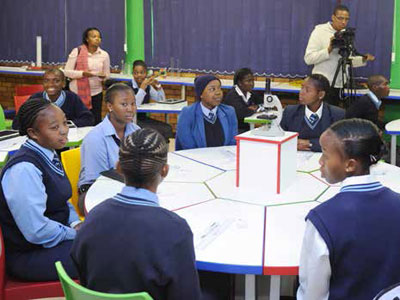 This paperless education system - a project branded the “Big Switch On” – will enable learners to have access to learning material and workbooks in the palm of their hands.
This paperless education system - a project branded the “Big Switch On” – will enable learners to have access to learning material and workbooks in the palm of their hands.
Classrooms at Boitumelong Secondary have been transformed into digital learning spaces with top of the range information communications technology, while the traditional chalkboard has become a thing of the past for teachers. Chalkboards have been replaced with big computer screens at the front of the classrooms.
Unlimited 4G data connectivity will ensure that learners can also do their work from home.
Speaking to Vuk’uzenzele at the launch of the “Big Switch On”, ecstatic learners at the school - most of whom have never owned a smartphone or a tablet - believed that the devices will help them match their counterparts in more affluent schools.
“I do not think I will ever miss a day of school again and I will never have a reason to fail science or maths ever,” said Grade 10 learner Pearl Mokoena.
Boitumelong Secondary School is one of seven Gauteng township schools taking part in the pilot project.
The Gauteng Education Department hopes to roll out the project to all Gauteng township and rural schools by the end of the 2017/18 financial year at an estimated cost of R17 billion.
All high school children will be provided with a tablet and Grade 7 pupils in primary schools will be trained to use the devices.
Permanent IT specialists will be on site at any given time to help the learners and educators with the new system.
Apart from surveillance cameras, each school will have two armed security officers. The tablets have also been fitted with tracking devices.
The project was launched by Deputy President Cyril Ramaphosa, Basic Education Minister Angie Motshekga, Gauteng MEC for Education Panyaza Lesufi and Gauteng Premier David Makhura.
Speaking at the launch, the Deputy President said the project by the Gauteng Department of Education is in line with the plan to improve the quality of education in the country.
“It enables educators and learners to access resources that exist beyond the walls of the classroom. Indeed, it enables them to access resources from the other side of the globe.
“It gives them access to the world. Importantly, it also gives them the skills that are needed to succeed in this world,” said Deputy President Ramaphosa.
He hoped that the project would motivate learners and make it easier for them to bridge the divide between the world of learning and the world of work.
“This divide - between the skills we learn and the skills we need - continues to frustrate our efforts to tackle youth unemployment. That is why we need to support this programme and to expand it.”
The Deputy President said ultimately the R17 billion project would boost the country’s economy.
Unlocking educational potential
Deputy President Ramaphosa also urged learners to embrace the opportunity given to them and commit to learning in order to succeed.
He said that he expects more than the 80.26 per cent pass rate, which the school received in 2014.
“Education will provide you with the tools and opportunities to overcome any obstacle that comes your way.”
Minister Motshekga was confident that the project would make schooling more exciting for learners.
“If I were a teacher or a learner now, I would be excited about this project. We are basically taking the learners to their world, the digital world and they will be able to work independently,” said the Minister.
Premier Makhura said the launch of smart schools was a revolution in education and a game-changing shift.
“We are witnessing a major transition, a revolution in education which is part of the transformation and modernisation in Gauteng,” he said.
Meanwhile, MEC Lesufi said that special care had been taken with security arrangements related the project. He said there would be a coordinated effort between police and the community to safeguard the equipment.
“We have put the most sophisticated tracking devices in all the tools. The police are trying to put one in one of their systems as well. So if you take a tablet from a child, we will be in a position to track it back anywhere in the country,” he said.
Broadband connectivity for N Cape rural communities
Broadband connectivity for N Cape rural communities Estelle GreeffA two-year deal between Square Kilometre Array (SKA) South Africa and telecoms operator Vox Telecom will see households in the rural communities in Northern Cape getting high-speed broadband connectivity.
 Speaking after the official announcement of the partnership, Alternative Communications and Spectrum Manager at SKA South Africa, Selaelo Matlhane said the deal would benefit both farmers and rural communities situated in areas protected by the Astronomy Geographic Advantage Act in the Karoo.
Speaking after the official announcement of the partnership, Alternative Communications and Spectrum Manager at SKA South Africa, Selaelo Matlhane said the deal would benefit both farmers and rural communities situated in areas protected by the Astronomy Geographic Advantage Act in the Karoo.
“When we came to the Karoo, we found the area with very little means of communication… Through this partnership… we are giving the community broadband connectivity.
“This two-year contract will ensure that Vox delivers… We want to ensure that they install high-speed broadband in 15 households per month and as SKA, we will pay the capital cost,” he said.
Matlhane added that SKA wanted to prove to the country that solutions such as the Northern Cape initiative could work.
“This is the first phase where we want to see a speedy deployment of satellite telecommunications. Vox got the contract [in December] but because they noticed that we need a speedy deployment, they have already started [working].
“As we speak, five houses already have - high speed telecommunications via satellite. They will have a very high-speed connectivity and means of communication, where they can call each other… The cost is very little to a point where it is only around two cents per minute when they are calling each other in the area.
“When they phone people outside their area, their rates will be comparable to any other cellphone or landline providers. Still, we have reduced the cost for satellite telecommunications to a very low cost because normally when people talk about satellite telecommunications, they talk about a very expensive solution.
“Basically, they will pay very little when they talk to each other,” Matlhane said.
The SKA is an international initiative to build the world’s largest radio telescope, which will enable astronomers to monitor the sky in unprecedented detail, thousands of times faster than any system currently in existence.
The lack of radio signals in the Karoo is what makes it one of the best locations in the world to build the SKA. However, Matlhane said protection requirements for the area meant that expanding access to telecommunications services needed to be done in a “radio astronomy friendly” manner that was affordable to local communities.
Matlhane said the Independent Communications Authority of South Africa (ICASA) had identified many villages in South Africa that did not have means of communications, since it was not financially viable for cellphone operators to deploy their resources to serve just a few people.
Most telecommunication operators prefer to go to towns where there are more people who can pay for the infrastructure, so that they can get a return on their investment.
Vox Telecom Senior Product Manager, Jacques Visser said: “As part of our long term strategy, we aim to bring high-speed internet connectivity to rural and agricultural areas in South Africa. We are excited about this opportunity to connect communities not only to their friends, families and suppliers, but also to the world of the internet.”
Clinics to serve people better
Clinics to serve people better Estelle GreeffService delivery
Clinics in the country will open on time and will not close until the last patient has been helped – even if it is beyond operating hours. They will ensure patients are treated with dignity.
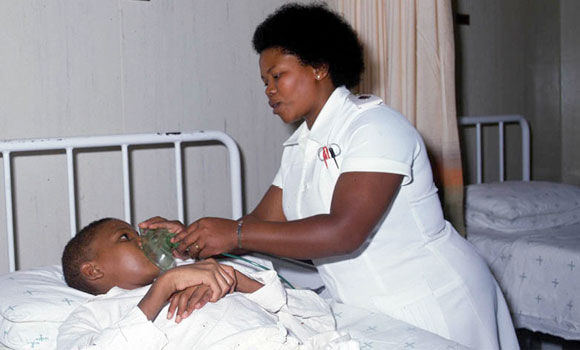 This is what South Africans can expect as government implements the second phase of Operation Phakisa called Operation Phakisa 2: Ideal Clinic Realisation and Maintenance.
This is what South Africans can expect as government implements the second phase of Operation Phakisa called Operation Phakisa 2: Ideal Clinic Realisation and Maintenance.
Through Operation Phakisa 2, the public health sector seeks to improve the quality of health care provided at 3 500 primary health care (PHC) facilities, which consist of government clinics and community health centres.
Operation Phakisa is modelled around the Big Fast Results methodology that was first applied by the government of Malaysia. The operation addressed their national key priority areas such as poverty, crime and unemployment.
It involves setting up clear targets and following up with an ongoing monitoring process, which makes the results public. Through this initiative, the Malaysian government registered impressive results within a short period. Launching the second phase in Pretoria recently, President Jacob Zuma said the implementation of the second phase would change the way clinics operated.
“It will be a clinic that opens on time in the morning, according to its set operating hours, and which does not close until the last patient has been assisted, even if this is beyond the normal closing hours.”
The President said the National Development Plan that was being implemented through programmes such as Operation Phakisa provided the vision of an ideal health care system.
The NDP talks about “a health system that works for everyone, produces positive health outcomes and is not out of reach”.
According to the President, this goal will only be achieved through a well-functioning health system anchored on PHC principles.
“This philosophy therefore continues to influence and guide our country as we prepare for the realisation of universal health coverage for all the people of South Africa, through the implementation of National Health Insurance,” said President Zuma.
He added that the attitude of staff would also change for the better. “It will be staffed by healthcare providers who treat people with dignity and observe the Batho Pele principles of Access, Consultation, Courtesy, Information, Service Standards, Openness and Transparency, Redress and Value for Money.”
Over 100 senior managers from all three spheres of government with their counterparts from the private sector, organised labour, academia, civil society and public entities participated in the Operation Phakisa laboratory to devise ways and means of making the ideal clinic concept a reality.
“They were supported in this process by officials from the Performance Management and Development Unit in Malaysia, where we learned this big fast results delivery model,” explained President Zuma.
The work of Operation Phakisa: Ideal Clinic Initiative was organised into eight work streams focusing on the different building blocks of an ideal clinic capable of delivering good quality health services.
The areas are service delivery, waiting times, human resources, infrastructure, financial management, supply chain management, scaling up and sustainability and institutional arrangements.
Ten clinics have been identified as ideal clinics and one of them is KT Motubatse Clinic in Soshanguve, north of Pretoria.
KT Motubatse Clinic is a PHC facility consisting of various departments such as dentistry, antiretroviral and tuberculosis treatment, rehabilitation and wellness.
Patients using the facility say they are satisfied with the service. Thirty-year-old Paulinah Matjia from Soshanguve says the service at the clinic is world-class.
“I’ve never seen people being turned away because there was no medicine and the staff is friendly,” she says. The clinic serves over 80 000 people.
Matjia’s friend Sisi Mabandla also expressed satisfaction with the service from the clinic. “Even people from other sections of Soshanguve come here. It means this clinic is doing something right,” she said.
The launch of the second phase of Operation Phakisa comes after government launched the first phase in Durban. The first phase focused on unlocking the economic potential of South Africa’s oceans.
A safe space for abused victims
A safe space for abused victims Estelle GreeffService delivery
Victims of abuse now have a place to go to where they can feel welcomed and get help without any prejudice.
 The first Green Door facilities in Gauteng were launched by the provincial Department of Community Safety late last year.
The first Green Door facilities in Gauteng were launched by the provincial Department of Community Safety late last year.
The facilities are run by members of the public in partnership with the department.
The Green Door concept was initiated by the then Premier of Gauteng, Nomvula Makonyane, who is now Minister of Water and Sanitation.
These centres are specifically designed for victims of domestic violence who live more than three kilometres away from a police station.
The service is operational on a 24-hour basis, but victims remain on the site for not more than six hours.
The Green Doors provide victims a safe place, counselling, advice on opening a case and taking action against their abusers, basic emotional support, basic care and a place to rest.
On arrival at the centre the victims are provided with toiletry packs, consisting of necessities such as toothbrush, soap and a facecloth.
They also use a facility for bathing and cleaning up before the police arrive to take them away.
These Green Door facilities are managed by an ambassador, who ensures that all the victims receive equal amounts of support and a place of comfort.
Green Door ambassadors are expected to have the following qualities: compassion, commitment, be available to assist the victims, have no criminal record as well as no recent trauma, involvement in rape, gender-based violence, sexual offences or domestic violence. They also need to have good people and interaction skills.
The Green Door ambassadors receive training on how to help victims deal with the situations they face.
The centres are open to neglected and abused male and female adults and children.
These centres work hand-in-hand with the police and Victim Empowerment Centres in communities, which provide counselling by qualified social workers.
A family member or a friend can report an abuse to the Green Door Centres on behalf of a victim of abuse.
Brown Lekekela, 32, is an ambassador of a Green Door centre in Diepsloot, north of Johannesburg. He runs the centre from his backyard, which is secured with palisade fencing.
The area where the centre is located is usually patrolled by police who respond quickly when they are called.
The facility is a homely and comfortable set up, with a couch and a bed, and toys for kids who come to the centre.
Lekekela has always been involved in community structures. After he completed his matric in 2006, he worked as a volunteer at the Diepsloot Police Station, working with victims of crime.
“I enjoy doing this work because it’s something that is in me and something I am passionate about,” said Lekekela.
His main responsibility at the centre is to welcome or receive victims by comforting them and then taking further action with their permission.
The following are ideal sites for setting up Green Door centres:
- Private and community spaces such as privately owned homes and churches.
- High-rise buildings and block of flats.
Leading the way in balancing the books
Leading the way in balancing the books Estelle GreeffService delivery
For the past seven years, the Sarah Baartman District Municipality in the Eastern Cape has been a model of clean administration.
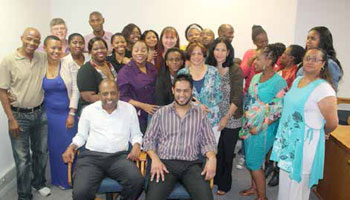 Since 2006, the municipality has achieved seven consecutive unqualified clean audits. It is one of the 46 district municipalities in South Africa servicing nine local municipalities. The municipality covers 34 per cent of the Eastern Cape's geographical footprint.
Since 2006, the municipality has achieved seven consecutive unqualified clean audits. It is one of the 46 district municipalities in South Africa servicing nine local municipalities. The municipality covers 34 per cent of the Eastern Cape's geographical footprint.
Executive Mayor, Khunjuzwa Kekana says the hard work to maintain the standard over the past years came as a result of a positive and stable working environment.
“The reason for this achievement is that the Sarah Baartman District Municipality operates in a stable political and administrative environment with a high level of oversight.
“It’s governance structures are all in place and operate effectively. There are effective internal controls and systems which result in reliable information.”
Two years ago, the municipality started a programme to assist its local municipalities to balance their books and improve their audit outcomes.
According to the 2013/2014 Auditor General’s Report, the programme is bearing fruit as three of the local municipalities that falls under Sarah Baartman District Municipality have also received an unqualified audit report. They are Baviaans, Camdeboo and Kouga local municipalities.
Municipal Manager Ted Pillay says they will not rest on their laurels but work harder to help the other municipalities to achieve an unqualified audit.
“We are very proud of this tremendous achievement by these municipalities. Our capacity building programme towards improving financial management in the local municipalities is continuing in the current financial year and we hope to achieve even better results.
“We will continue with this programme until we are satisfied that all local municipalities in the district have good financial controls in place and thus achieve good audit opinions.”
According to Kekana one of the factors contributing to the effective administration in the municipality is continuity in top management.
Both the Municipal Manager Ted Pillay and the Chief Financial Officer Danie de Lange have been in these positions for the past thirteen years.
Putting the spotlight on youth challenges
Putting the spotlight on youth challenges Estelle GreeffYouth matters
As a political activist, youth challenges like unemployment, drug abuse and HIV/ Aids were close to the heart of Buti Manamela.
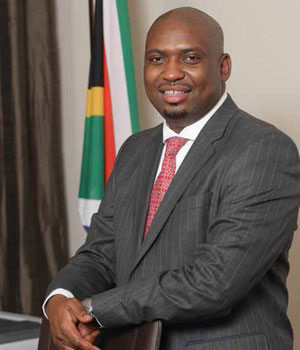 Today he is the Deputy Minister in the Presidency for Performance, Planning, Monitoring and Evaluation and is still addressing the concerns of the country’s youth.
Today he is the Deputy Minister in the Presidency for Performance, Planning, Monitoring and Evaluation and is still addressing the concerns of the country’s youth.
The Deputy Minister was a student leader in 1993 and held several youth activist roles before becoming a Member of Parliament (MP).
Five years ago, he was among those who helped draft the Youth Employment Accord. This is a social pact that government, business, labour, community and youth organisations signed at the Hector Pieterson Memorial, Soweto, on April 2013.
It pays urgent attention to youth employment and skills development, and has helped place tens of thousands of young South Africans in internships and created jobs in government and state entities.
“We need to get young people employed but we also need to get young people in education and skills institutions. We need to get young people into entrepreneurship. We need to get young people into internships,” said the Deputy Minister, who was appointed in May 2014.
Statistics South Africa (Stats SA) reports that people aged between 15 and 35 make up more than 40 per cent of the population and 36 per cent of them are unemployed.
National Youth Policy
Late in 2014, Cabinet approved that the Draft Youth Policy 2014 – 2019 be made available for public comment. Citizens are being asked to tell government what the youth policy should prioritise.
The existing National Youth Policy outlines interventions to advance youth development. These include economic participation, education and skills development, health and wellbeing, civic participation and social cohesion, National Youth Service and youth work.
The progress made in assisting the youth is also being reviewed to make sure the National Youth Development Agency (NYDA), which was established in 2009, tackles youth issues successfully.
The Deputy Minister said when the NYDA was established, there was the perception that it would solve all challenges facing young people. The youth’s expectations put a heavy burden on the agency.
“We are reviewing the mandate of the NYDA. We will most probably review the way in which it is structured through the act and what we want to do is finalise the National Youth Policy. We have until March.
“Once we have finalised those, we can then say what type of structures we need, over and above what government does,” he said.
The National Youth Policy rests on four pillars – youth employment, entrepreneurship, education and skills and social mobilisation. These will take youth development forward if all government departments and state-owned entities work together, says Deputy Minister Manamela.
Service delivery
The Deputy Minister adds that one of the priorities of his department is monitoring the performance of front service staff at key service delivery departments.
“One of my passions has been the front-line service desk where we do announced and unannounced visits and we follow-up on the previous visits.
“In that way, firstly we get service to service delivery points to make sure that they deliver at all times,” he said.
The visits vary from him visiting police stations, hospitals, clinics, schools, Home Affairs offices and even provincial NYDA offices.
“I think the idea that at any given point, either the President, Deputy President, Minister or Deputy Minister would have an unannounced visit keeps most of our public servants on their toes to ensure that they get government to work,” he said.
He also oversees the performance of the Presidential Hotline and the Presidential Siyahlola visits.
These served as crucial platforms for members of the public to interact directly with their leaders, and raise their concerns and aspirations directly.
Listening to the youth
The Deputy Minister is active on Twitter, a platform through which the youth have been able to raise their concerns with him.
“It is a social space where unedited, young people get to say what they think. There is constructive criticism; there are issues that young people raise. I think for the past six months, they have been tweeting about issues mainly about the NYDA.
“Young people complaining about services [they are or not receiving], and I have been forwarding them to the NYDA and they have been able to respond on the issues raised. So I have generally been getting constructive feedback.”
The Deputy Minister’s username on twitter is @butimanamela.
Small business creates much-needed jobs
Small business creates much-needed jobs Estelle GreeffYouth matters
Funeka Rexika Hardware Store, which started operating in 2013, is helping to create much-needed employment in the small town of Mataffin in Nelspruit, Mpumalanga.
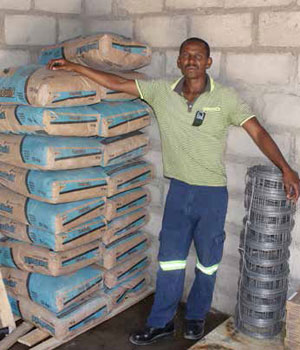 The owner, Jephrey Mathunganda, 35, runs the hardware store from his backyard and sells building material such as cement, brick force, tiles and wood.
The owner, Jephrey Mathunganda, 35, runs the hardware store from his backyard and sells building material such as cement, brick force, tiles and wood.
Mathunganda’s business is the only one that offers these services in the area and as such does not struggle to get customers. However, this has its own challenges.
“It’s not simple running a business in a place where the people know you because some people will always ask to buy materials at a discount or on credit. If I say no, I don’t know what they go around saying in the community about me,” said Mathunganda.
Back in 1991, when Mathunganda worked at a hardware store, he had a dream to have his own store one day to cater to the needs of the community.
“I had a dream and knew the only way of realising it was if I had enough money to purchase the products, because I had already used the money I had to build business premises. I then decided to look for sponsorship and that was when I came across the National Youth Development Agency (NYDA),” said Mathunganda.
In the middle of 2013, Mathunganda applied for funding at the NYDA and he received R8 000 in July 2014 to buy material he needed to start his business.
The NYDA also took him through a small enterprise start-up course to help him understand how to manage a business.
Today his business is growing from strength to strength and he is able to make a decent profit every month. He employs three permanent staff members and two part-time workers. One of the part-time employees, Lindokuhle Mpinga, 23, is studying towards her matric qualification at an Adult Basic Education and Training centre in the area.
“I want to see my business grow so that I can create more jobs for the people in my area,” said Mathunganda.
Bursary helps fulfil a dream
Bursary helps fulfil a dream Estelle GreeffGrowing up in the small town of Vlaklaagte in Mpumalanga, Ernest Mahlangu wanted to become an information technology (IT) specialist.
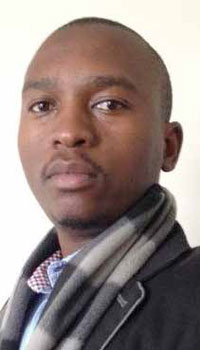 However, things did not go according to plan for the 29-year-old, whose application for an IT course was turned down. Mahlangu moved on to ‘Plan B’, which was architecture.
However, things did not go according to plan for the 29-year-old, whose application for an IT course was turned down. Mahlangu moved on to ‘Plan B’, which was architecture.
“I sketched a lot growing up and would sketch almost anything just to express my ideas on paper, this carried through from primary right through to high school. This is where my interest in architecture first started,” said Mahlangu.
After his dreams of becoming an IT specialist faded, Mahlangu visited the Architecture Department at the University of Pretoria.
Drawn in by the models and drawings on display, he knew right away that architecture was what he wanted to do.
Mahlangu applied to study architecture and completed his degree at the university.
While looking for potential sponsors to fund his postgraduate degree in 2007, he came across the Masakh’iSizwe (MIS) Bursary and wasted no time applying.
The bursary is administered by the Western Cape Department of Transport and Public Works, through its MIS Centre of Excellence initiative. The centre works with higher education institutions (HEIs) in the Western Cape in developing programmes that highlight values and attitudes needed to develop the economy.
The bursary programme helps students pursuing diplomas or degrees in transport, engineering, the built environment or any other field identified as scarce or critical by the department.
He completed his Honours and Masters studies at the University of Cape Town in 2010, with the help of the MIS Bursary.
Mahlangu started working at the Department of Transport and Public Works in 2011 at the MIS Centre of Excellence as a candidate architect.
“The goal from the onset was to be a professional architect and I have just recently written my professional practice exam, so I am almost there,” added Mahlangu.
“I never imagined that I would be working in the public sector, as there is not much design involved and my work is more project management, which plays an important role in the built environment.”
Mahlangu’s unit is responsible for providing education facilities throughout the Western Cape.
“I get to directly contribute towards nation building, which for me is very important. Every time a community receives a new school, it brings me more joy,” he said.
Small businesses empowering their communities
Small businesses empowering their communities Estelle GreeffSouth African National Parks (SANParks), through the Expanded Public Works Programme (EPWP), has partnered with small businesses to create jobs in local communities in the Western Cape.
The EPWP, which falls under the Department of Public Works, was launched in 2004 to provide temporary or ongoing work opportunities to alleviate unemployment and poverty.
SANPark’s Walter Mzimba, who is the Cluster Manager: Garden Route National Park - Biodiversity Social Projects, said the aim of the EPWP is to address poverty by creating jobs for the unemployed, especially women, youth and people with disabilities.
According to Mzimba, SANParks is one of the implementers of various programmes under the EPWP.
“Beneficiaries employed in the programme come from marginalised communities neighbouring SANParks and most, if not all, were unemployed,” he said.
One of the beneficiaries of the programme is Nosabatha Mbanzi, owner of Melodyhills, which is responsible for the maintenance of the park and garden areas.
She employs 16 workers, mostly young people.
“I employ mostly young people because it helps them put food on the table,” said Mbanzi.
Elsa September’s company, Elsa Contractors, removes alien plants for SANParks. Alien plants are a threat to biodiversity and clearing them reduces the impact of floods and wildfires, and also restores biodiversity.
September has been working with SANParks since 2006 and employs 12 people.
The work that September does for SANParks is continuous as various plants grow in different seasons.
Sonja Peterson, who initially started as a general worker at SANParks, is now responsible for maintaining the gardens. Her business, Bush Clearing, employs six people and is responsible for maintaining grass parks and hiking trails.
After being encouraged by a friend to join the programme, Peterson has not looked back. She enjoys what she does and that she can create jobs.
“If I can do my work, I’m relaxed. It puts food on the table,” she said.
Register your child’s birth early
Register your child’s birth early Estelle GreeffThe Department of Home Affairs has called on all parents to register their babies when they are born or within 30 days of birth. Timely registration of birth must, and will soon be, the only way in to the National Population Register (NPR).
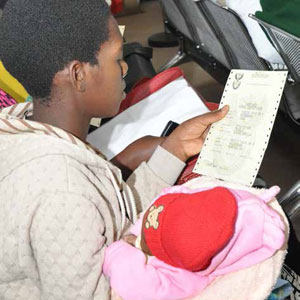 This is in line with the announcement by Home Affairs Minister Malusi Gigaba during his Budget Vote last year that the department intends ending all late registration of birth (LRB) by end of December 2015, after which all late applications for birth would go through an appeal and adjudication process.
This is in line with the announcement by Home Affairs Minister Malusi Gigaba during his Budget Vote last year that the department intends ending all late registration of birth (LRB) by end of December 2015, after which all late applications for birth would go through an appeal and adjudication process.
Following the announcement, the department intensified the on-going National.
Last month, Home Affairs Minister Malusi Gigaba handed over unabridged birth certificates to parents of newborn babies at the Netcare Femina Hospital in Pretoria as part of the NPR campaign.
How to register a birth
A parent, guardian or any other person legally responsible for the child must complete form BI-24 (with black ink only) and it must be submitted to the nearest office of the Department of Home Affairs if you are in South Africa, or the nearest South African embassy, mission or consulate if you are overseas.
The department, together with the Department of Health, have also partnered to make child registrations easier by providing a service of registering newborn babies at the hospitals with the help of home affairs officials.
Late birth registrations are divided into three categories:
- After 30 days but before one year.
- After one year but before 15 years.
- After 15 years and older.
Parents who register their children after 30 days but before the age of one will have to fill in form BI-24 which must then be completed and submitted along with written reasons why the birth was not registered as required in the Births and Deaths Registration Act.
Once the application is successful it will be forwarded to the department’s head office for the allocation of an identity number and be archived.
Those who register after one year but before 15 years will have to complete form BI -24/1 and attach written reasons why the birth was not registered as required and an affidavit written by the parents, legal guardian or a close relative at least 10 years older than the child.
For the application to be processed quickly the department will need the following:
- A certificate from the hospital or maternity home where the child was born.
- Confirmation of the child’s personal details.
- The child’s baptismal certificate and clinic card.
During application parents will be interviewed and have their fingerprints verified against the national database.
For those parents who register their children after the age of 15 the process gets more complicated as they have to complete form DHA-24, DHA-24/A x 2 and DHA-288 for the registration of birth. Also, they must be South African citizens or hold a valid South African identity document.
To avoid following long procedures to have your child or children registered, rather register your new born at birth or within 30 days of their birth.
For more information call the Home Affairs toll free line: 0800 60 11 90 or visit: www.dha.gov.za
Domestic workers get decent pay
Domestic workers get decent pay Estelle GreeffThe increase in domestic workers’ annual wages that came into effect on 1 December 2014 has brought some much-needed relief to domestic workers and is a sign of government’s commitment to create decent work.
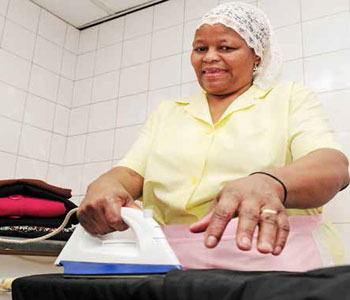 The new sectoral determination for domestic workers, announced by Labour Minister Mildred Oliphant last year, prescribes that for year one (1 December 2014 to 30 November 2015) minimum wages for domestic workers who work more than 27 ordinary hours per week will be increased as follows:
The new sectoral determination for domestic workers, announced by Labour Minister Mildred Oliphant last year, prescribes that for year one (1 December 2014 to 30 November 2015) minimum wages for domestic workers who work more than 27 ordinary hours per week will be increased as follows:
- Area A (those in major metropolitan areas) R10.59 hourly rate, R476.68 weekly rate and R2 065.47 monthly rate.
- Area B (those not covered in Area A) R9.30 hourly rate, R418.32 weekly rate and R1 812.57 monthly rate.
From 1 December 2014 to 30 November 2015 the minimum wages for domestic workers who work 27 ordinary hours per week or less in major metropolitan areas is R12.40 hourly rate, R334.74 weekly rate and R1 450.33 monthly rate.
For those who do not work in major metropolitan areas the hourly rate is R296.35 and the monthly rate is R1284.09.
In the second and third year of the sectoral determination (1 December 2015 to 30 November 2016 and 1 December 2016 to 30 November 2017), minimum wages will be increased by using the previous year’s minimum wage plus Consumer Price Index (CPI) (Lowest quintile) plus an additional 2,5 per cent for Area A. The CPI is an inflation target measure that tracks the rate of change in the prices of goods and services purchased by consumers.
For Area B however, minimum wage increases will be pegged at the previous year's minimum wage plus CPI (lowest quintile) plus an additional 4.5 percent for year two and the previous year's minimum wage plus CPI (lowest Quintile) plus an additional 3.5 per cent for year three (December 2016 to 30 November 2017).
The increase is a result of a consultation process to review the current threeyear cycle of sectoral determination advising minimum wages and conditions of employment for the sector that was conducted by the Department of Labour in June 2014.
In addition to the national public hearings, the Department of Labour also held izimbizo with domestic workers in various provinces in 2013 to get a better understanding of the Domestic Worker Sector and how to deal with problems facing the sector.
The increase will help protect vulnerable workers who are exposed to possible exploitation, where they work in organisations where trade unions are absent and where workers are not covered by regulating mechanisms.
The department aims to create a decent work environment to ensure that domestic workers have the same rights as other workers.
| Area 1 | December 2015 to 30 November 2016 | 1 December 2016 to 30 November 2017 |
| Area A | Previous year’s minimum wage + CPI + 2,5 per cent | Previous year’s minimum wage + CPI + 2,5 per cent |
| Area B | Previous year’s minimum wage + CPI + 4,5 per cent | Previous year’s minimum wage + CPI + 3,5 per cent |
For information visit: www.labour.gov.za
Trust restores dignity
Trust restores dignity Estelle GreeffA Re Itireleng Trust is giving visually and physically impaired people in Ga- Rankuwa, north of Pretoria, the opportunity to gain skills and live better lives.
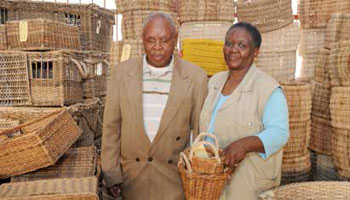 A Re Itireleng means ‘let’s do it ourselves’ in Setswana. The trust was established in 2010 as a non-profit organisation. Their workshop trains mainly visually and physically impaired people in sewing, knitting, mesh-fence manufacturing, and the production of cane furniture and baskets.
A Re Itireleng means ‘let’s do it ourselves’ in Setswana. The trust was established in 2010 as a non-profit organisation. Their workshop trains mainly visually and physically impaired people in sewing, knitting, mesh-fence manufacturing, and the production of cane furniture and baskets.
The chairperson of the trust, John Sechogo, says the name of the trust was inspired by the fact that people with disabilities are also able to do anything they decide to do.
“Just because we are blind does not mean we cannot do things for ourselves,” he says.
Alina Matsapola, the workshop manager, says of the 82 people working at the workshop, 80 per cent of them are blind.
The centre has four sections for manufacturing cane furniture, weaving baskets and furniture, producing mesh-wire fencing and sewing.
Cane furniture
The cane is first boiled and shaped accordingly, and then taken to the furniture department for further development. Furniture that needs to be woven is then taken to the weaving section where they place a design and pattern on the bare furniture.
 Alfred Bokaba, an employee in the furniture section, joined A Re Itireleng in 2010. He lost his eyesight in 1979 after a botched operation. He says through A Re Itireleng he is able to do something with his hands to improve his life and not sit at home feeling helpless.
Alfred Bokaba, an employee in the furniture section, joined A Re Itireleng in 2010. He lost his eyesight in 1979 after a botched operation. He says through A Re Itireleng he is able to do something with his hands to improve his life and not sit at home feeling helpless.
“I am able to earn money to buy a few items at home. I am also able to do something for myself and put food on the table,” he says.
In the weaving section baskets are formed and shaped by individuals, mostly young people, who are all completely blind. This section also does furniture weaving if needed.
Khazamula Shokane, a trainer at the weaving baskets section, lost his eyesight in 1966 due to measles.
He has been working for A Re Itireleng since 2010, and trains and motivates the youth.
“I always tell them that being blind is not the end of your life. I can do anything and everything, except drive,” he says.
The mesh-wire fencing section is where fences are made by partially blind and blind individuals who operate a fence-making machine.
Lucas Kopaopa, who lost his eyesight in 1975 also due to measles, joined A Re Itireleng in 2010. He is partially blind.
“I enjoy working here at A Re Itireleng, it keeps me busy,” he said.
In the sewing section, partially and completely blind women produce cushions for the furniture and baskets made at A Re Itireleng.
Bessie Sekatane, who lost her eyesight due to a cataract, works at this section and is a switchboard operator. Sekatane also teaches classes to visually impaired people.
Sechogo says he wishes for the centre to be around for a long time to help people live fulfilling and productive lives.
The trust is supported by the Gauteng Department of Social Development, which assists financially, and the Department of Rural Development and Land Reform, which provides raw materials.
Senior Project Officer at the Department of Rural Development and Land Reform, Meschack Mabudusha, said the A Re Itireleng Trust was an inspiration to the community.
He added that the lesson others could learn from the trust was to provide opportunities for all people, regardless of the challenges they faced.
Centre helps rural community
Centre helps rural community Estelle GreeffThe Devon Impumelelo Development Centre (DIDC) has made it easier for people in Devon, Gauteng, to access information without having to travel long distances.
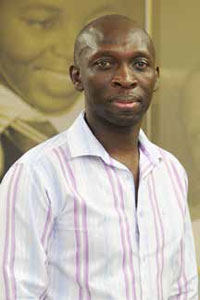 The centre was registered in 2012 as a non-profit organisation and has partnered with the departments of social development and rural development and land reform to help the community access information and infrastructure normally found in cities and big towns.
The centre was registered in 2012 as a non-profit organisation and has partnered with the departments of social development and rural development and land reform to help the community access information and infrastructure normally found in cities and big towns.
“People had to travel long distances to get assistance with certain information,” said Mashele Lukhele, who is the Chairperson of the DIDC.
The centre is divided into four functions - entrepreneurial programmes, social programmes, business programmes and information, and referrals.
The entrepreneurial pillar has two components – brickmaking and carpentry.
The social pillar has programmes that assist the community with life skills such as managing finances or dealing with the struggles of life in general.
“We have workshops for drug and alcohol abuse, teenage pregnancy and general life problems. We sometimes call social workers for assistance,” said Lukhele.
The business pillar has programmes that help the community with computer skills.
“We teach them how to use the computers and then they are able to use these skills to better themselves.”
The information and referral pillar offers the public information on government programmes.
“If you want assistance with something concerning government, we refer you to specific bodies in government, for example if you want to know about ID, SASSA, basically anything concerning government.”
This centre has computer facilities for people who want to access information, do homework and look for work.
The computer centre is also used as a training centre for those who want to become computer literate.
“We teach them computer skills, for example how to use the Internet, email and Microsoft Office. We also test them to see if they have learned anything.
“We do not have an age limit, everybody is welcome to learn.”
The DIDC has six permanent staff members and six people on learnership from the community.
A group of Grade 10 learners, who spoke to Vuk’uzenzele, were happy about the services they get at the centre.
“It helps us a lot, because we get our past exam papers from this centre. It also helps us with our homework assignments.”
Project Coordinator Koena Matlala from the Gauteng Department of Rural Development and Land Reform said Devon was identified as a Comprehensive Rural Development Programme (CRDP) site in 2009.
The CRDP aims to mobilise and empower rural communities by, among other things, addressing issues such as underdevelopment, hunger, poverty, joblessness, lack of basic services and redistributing 30 per cent of the country’s agricultural land.
“The centre has really helped the community in a big way and there are many centres like it in other rural communities, where people cannot access information as easily,” said Matlala.
Farming project alleviating poverty
Farming project alleviating poverty Estelle GreeffRealising that her community at Hekpoort in Gauteng was poverty- stricken, Nthabiseng Thupana decided to do something drastic about it.
In 2007 she started the Sekgutlong Project, which farms chickens, sheep and cows.
It all started in 2006, when her curiosity about farming inspired her to do a course in poultry farming.
“I did not have any experience when it came to farming. So I did my research and registered for a course to learn about poultry farming.”
After completing her course, Thupana identified land that was for sale and she approached the Department of Rural Development and Land Reform (DRDLR) for help.
Thupana is a beneficiary of the DRDLR’s Proactive Land Acquisition Strategy, where the department purchases land with high agricultural potential and then selects beneficiaries who can lease it with the option to purchase it.
In 2007 the department bought the land she had identified and that is when her career as a farmer started.
In 2008, Thupana won the Female Farmer of the Year Award.
“I was the first black female around Gauteng producing more than 100 000 birds. You can only get contracts if you are growing more than 100 000 birds.”
“The government expects us to hire youth on our farms, especially in our rural communities. We are expected to groom these young people.
“We sometimes have students from the North West who come to the farm and stay here for two months and do their practicals,” she said.
Aifheli Mamphodo from the DRDLR said the project has made a huge impact by creating jobs for locals.
“The project contributes to food security by producing chickens.”
Thupana said she intends to expand the farm and start producing even more chickens so that she can be the primary supplier of chicken to other retailers.
How to secure land from government:
- You must complete a standard application form.
- The department places it on the database.
- The department will call you for an interview to determine your knowledge of farming.
- You sign an offer to purchase land that you have identified.
- The department will assess the land, purchase it and lease it to you, with the option to buy it.
Parole: An opportunity to start afresh
Parole: An opportunity to start afresh Estelle GreeffParole offers offenders a second chance to reintegrate into society and become law-abiding citizens.
This is the view of Acting National Commissioner for Correctional Services, Zach Modise.
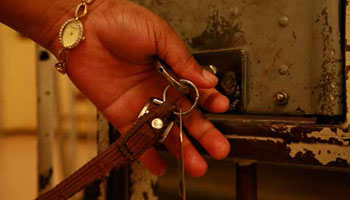 According to Modise, parole is an internationally accepted method that allows the conditional release of offenders from a correctional centre into the community before the end of their sentence.
According to Modise, parole is an internationally accepted method that allows the conditional release of offenders from a correctional centre into the community before the end of their sentence.
He said in South Africa, parole is known as a placement option from a correctional centre into the system of community corrections.
“The offender serves the remainder of the sentence outside of a correctional centre based on specific conditions. This also gives the offender the opportunity to reintegrate in the community while under supervision,” he said. Parole also gives offenders an opportunity to mend their ways.
“This is also to combat the probability of reoffending by ensuring gradual integration back into the community under controlled circumstances. This gives communities the opportunity to accept their responsibility in the rehabilitation of offenders.”
Modise emphasised that parole was not a right for offenders but rather based on the offender’s merit while at a correctional centre.
The decision to grant an offender parole lies with the Correctional Supervision and Parole Board.
There are currently 53 boards designated to correctional centres across the country, which are responsible for dealing with parole matters and supervision.
The boards comprise community members appointed by the Minister of Justice and Correctional Services and officials from the department.
To qualify for parole, an offender must have served half of the sentence.
“Offenders who received life imprisonment can be eligible for parole after serving 25 years of their sentence but the decision to grant parole lies with the Minister. Persons declared habitual criminals could receive parole after serving at least seven years.”
The manager of a correctional centre decides parole for offenders sentenced for 24 months and less.
The decision to grant parole also depends on the merit of the offender and the offender’s sentence plan.
When an offender is sentenced, a sentence plan is allocated to determine how the offender can be rehabilitated.
For example, it is established if an offender may need counselling or education. These factors are included in their sentence plan and addressed in the quest to rehabilitate the offender.
As part of monitoring behaviour, a case management committee is appointed to meet with the offender every six months up until the date of release.
“The committee looks at whether the offender is showing remorse; whether there is willingness to change and if the rules and regulations of the correctional centre are being followed.
“The committee then makes recommendations to the parole boards for the offender to be paroled.”
When considering an offender for parole, special attention is given to the type of crime committed, length of the sentence, how the crime was committed and the offended, among others.
“When consideration is given to release an offender, the potential risks related to placement are thoroughly considered and measures are put in place.”
The offender, however, continues to be under supervision until the sentence has expired.
Different types of methods to monitor paroled offenders include house arrest, community service and electronic monitoring.
People affected by the crime committed also have the right to give their views to the parole board before an offender can be paroled.
“The offended may make representations to the board and they may even be allowed to attend sessions of the board.”
The different types of parole include day and medical parole.
An offender granted day parole may leave the correctional centre during the day and return at night.
“Day parole allows offenders to be part of the community; it is part of gradual integration.”
According to Modise, day parole is for longterm prisoners to help familiarise them with changes in the outside world.
This also gives offenders a chance to strengthen their ties with their families or to find employment before being released.
Regarding medical parole, Modise explained that if a hospitalised offender’s health condition deteriorated rapidly, the hospital would write a report to the case management committee.
The committee would make a recommendation to the Medical Advisory Board, which then advises the Minister to release the offender on medical parole.
When the offender is released on medical parole, strict measures include being monitored by the department until the end of the sentence.
Modise said placement under supervision could be considered for offenders with a sentence of five years and less.
“When an offender serves one sixth of their sentence they can be considered for placement outside a correctional centre on conditions.”
These conditions include being placed under house arrest or monitored electronically until the end of the sentence.
Modise encouraged communities to support offenders when they reintegrate into a community.
“We urge the public to allow offenders a second chance into the community, especially if they have changed.”
Everybody deserves a second chance in life, Modise pointed out.
Creating jewels in Limpopo
Creating jewels in Limpopo Estelle GreeffThe Small Enterprise Development Agency Jewellery Incubator in Limpopo is helping entrepreneurs in and around Polokwane to realise their potential and create jobs.
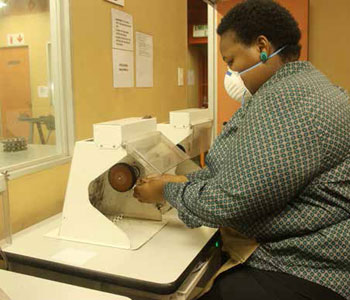 The incubator offers learnerhips targeting young people aged between 18 and 35 with a Grade 12. It runs for 18 months and participants receive a monthly stipend. The incubator helps entrepreneurs through workshops, gives access to the market and pays for their participation at exhibitions.
The incubator offers learnerhips targeting young people aged between 18 and 35 with a Grade 12. It runs for 18 months and participants receive a monthly stipend. The incubator helps entrepreneurs through workshops, gives access to the market and pays for their participation at exhibitions.
Among the beneficiaries are entrepreneurs Mulayo Serakoana and Anna Maponya.
Although the two women come from different backgrounds, their common goal and determination to make a success of the opportunity given to them by the incubator brings them closer.
Serakoana dropped out of the University of the Witwatersrand while Maponya never had a chance to study at a tertiary institution.
“All that we want to do is make a living and make a success out of our business. The world is not open to entrepreneurs and people who are starting businesses, but we are determined to make it,” vowed Serakoana in an interview with Vuk’uzenzele at the incubator’s office in Polokwane.
After dropping out of university, life was difficult for Serakoana. One day she walked into a bead shop and her love for beads was ignited.
“I was in that shop for over two hours just looking and admiring what was in there. It was only afterwards that I realised that I had a love for beadwork.”
She says she asked the shop owner in Queens Corner in Queenswood, Pretoria, to help her to do beadwork and that is how she got involved in the jewellery business.
Her business, Seremane Creations, makes jewellery such as necklaces, bracelets, rings and body chains. Her items sell from R120 to R250.
Her involvement with the incubator started when she saw an advert for a new centre opening in Polokwane to train people in jewellery making. She sent her application and profile, and was chosen to be one of the beneficiaries.
Maponya’s story on the other hand is different to that of Serakoana. Her love for beadwork started early in life.
“I’ve always had a love for beads. Even when I was growing up, I used to wear them,” she says.
She says her involvement with the incubator has given a chance to grow her business and do what she loves the most. Her beadwork sells for between R80 and R240.
Business Development Officer at the incubator Mmabatho Malatji says the incubator is responsible for developing the skills of beginners.
“We offer mentoring and coaching and we organise business exhibitions for them to sell their products.”
She adds that although there were participants who were dragging their feet, most of them had shown an interest in the programme and their level of interest was satisfactory.
“They’ve shown some zeal and we are happy with their commitment,” she says.
Why China is important to SA
Why China is important to SA Estelle GreeffInternational relations
It took many by surprise when China became Africa's largest trading partner in 2009, surpassing the United States.
Since then, China’s growing presence in Africa has become a subject of discussion, especially among the foreign press. Everyone, from analysts to politicians and ordinary people on the street, suddenly had a view on the Chinese.
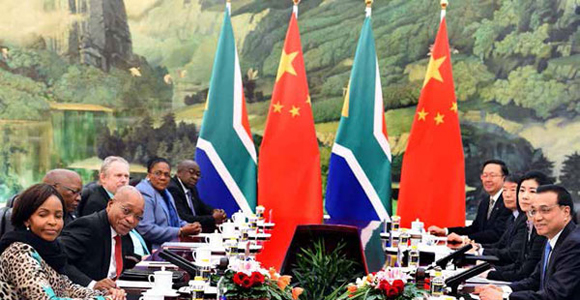 China’s rapid rise as an influential player in Africa has led many to question the nature of its involvement on the continent. Many questioned the intentions of the Chinese while some even went as far as ridiculing products offered to Africans by China as “fong kong”. Some became suspicious when the Chinese started to build roads, dams, stadiums and hotels in Africa. They asked: What does China want in return? Of course, as it invests in Africa, China is taking advantage of the continent’s rich natural resources to meet the growing needs of its people.
China’s rapid rise as an influential player in Africa has led many to question the nature of its involvement on the continent. Many questioned the intentions of the Chinese while some even went as far as ridiculing products offered to Africans by China as “fong kong”. Some became suspicious when the Chinese started to build roads, dams, stadiums and hotels in Africa. They asked: What does China want in return? Of course, as it invests in Africa, China is taking advantage of the continent’s rich natural resources to meet the growing needs of its people.
By 2013, China recorded nearly R2.2 trillion in trade flows in Africa, making it clear that they want to become the most influential foreign power in Africa. China's total trade with South Africa increased from about R190 billion to R270 billion in 2013 and is rapidly approaching R300 billion.
It is for this reason that President Jacob Zuma’s visit to China in December last year was viewed with keen interest. The State visit to China by our President reinforce the close ties shared between China and South Africa and highlighted the depth of our relations, not only in the political realm of BRICS – the group of five major emerging national economies: Brazil, Russia, India, China, and South Africa - but also in business, agriculture, tourism, cultural exchanges, academic co-operation and scientific research.
South Africa doesn’t see its relationship with China as just based on trade, but a partnership rather, that is aligned to our development goals. China, on the other hand, regards South Africa as a key partner in advancing its relations with the African continent.
This is seen in the context of investments the Chinese have made in South Africa over the past few years and the value such investments have had on our economy. Our relations with China have reached new heights, in the short space of 15 years. It’s hard to believe that bilateral trade volume was aboutR12 billion when the diplomatic relationship was first established.
In 2012, the figure reached nearly R660 billion, which means a 40-fold increase in the past 15 years. Subsequently, this made China South Africa's largest trading partner, largest export market and largest source of import for the past four years. South Africa is also China's largest trading partner in Africa. Between January 2003 and January this year, 38 foreign direct investment projects were recorded representing a total capital investment of R13.33 billion or an average investment of R350.5 million for each project from China. Chinese investments in South Africa have contributed to job creation. During the period, a total of 10 992 jobs were created.
In 2014, the Chinese went a step further in investing in our economy when car manufacturer First Automobile Works (FAW) invested R1.1 billion to build a vehicle assembly plant in Coega, in the Eastern Cape, which is expected to produce up to 35 000 passenger vehicles in the coming years. In 2013, technology producer Hisense opened a factory in Atlantis, north of Cape Town, employing 300 South Africans in the production of goods for export to the broader African market. Cement producer Jidong Development Group and the China- Africa Development (CAD) Fund recently agreed to establish a R1.8 billion cement plant in Limpopo, with a projected production rate of 1 million tons of cement at full production.
As we review the status of our bilateral relations with the People’s Republic of China, we aim to ensure that the excellent growth path that we have already defined is strengthened with our focus on the priority issues of development in South Africa and Africa.
SA assumes G77 chair
SA assumes G77 chair Estelle GreeffInternational relations
South Africa has assumed the chair of the largest coalition of developing countries in the United Nations (UN), the Group of 77 (G77).
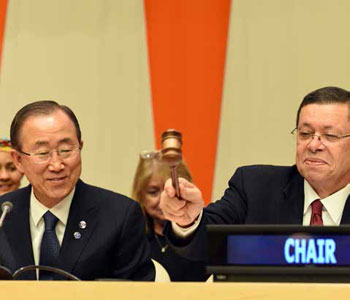 The G77 is a platform for the countries of the South to articulate; promote their collective economic interests and enhance their joint negotiating capacity on all major international economic and development issues in the UN’s system.
The G77 is a platform for the countries of the South to articulate; promote their collective economic interests and enhance their joint negotiating capacity on all major international economic and development issues in the UN’s system.
The body also promotes South-South cooperation and strengthens economic and technical co-operation among developing countries themselves.
Deputy Minister of International Relations and Cooperation, Luwellyn Landers, who accepted the responsibility of chairing the G77, thanked the members of the G77 for placing its trust and confidence in South Africa.
Deputy Minister Landers also paid a special tribute to the President of the Plurinational State of Bolivia, Evo Morales Ayma, for Bolivia’s stewardship of the G77 and China during 2014.
He said South Africa “will spare no effort in continuing Bolivia’s legacy by ensuring that we collectively enhance the development agenda of the South”.
South Africa will chair the G77 during the 70th anniversary of the UN at a crucial time in the global community’s efforts to agree on the development priorities and goals needed to take the work of the Millennium Development Goals (MDGs) forward and to transform development beyond 2015.
This year is also an important year for the UN Framework Convention on Climate Change (UNFCCC), as a new legal instrument that contains commitments for both developed and developing countries is expected to be adopted under the Durban Platform for Enhanced Action.
During its term, South Africa will be responsible for negotiating and speaking on behalf of two-thirds of the UN membership on key development issues.
“After 50 distinguished years, the G77 remains all the more relevant, specifically at this important juncture when the international community is considering our collective development aspirations beyond 2015,” said Deputy Minister Landers.
Honouring sporting heroes
Honouring sporting heroes Estelle GreeffSport, arts and culture
For the third consecutive year, government has honoured the country’s sporting heroes. The cream of the crop, as described by Minister of Sport and Recreation Fikile Mbalula, received recognition for their achievements in the past year.
 “Today we will honour our pride and our heritage of the South African sporting fraternity for what they have achieved throughout the year and we will equally remember those who passed on,” said Minister Mbalula.
“Today we will honour our pride and our heritage of the South African sporting fraternity for what they have achieved throughout the year and we will equally remember those who passed on,” said Minister Mbalula.
According to Minister Mbalula, the SA Sports Awards will increase the profile of the country’s athletes on the international stage.
“To all our athletes, I want to say to you that this is your occasion, never again will our athletes go around not being recognised for all they put in for this country.”
The department also honoured the country’s fallen heroes. The Minister said the fallen sport stars may be gone but they would not be forgotten for having made the country proud.
 In October, South Africans paid their last respects to three sporting heroes – middle distance runner Mbulaeni Mulaudzi, Bafana Bafana captain and goalkeeper Senzo Meyiwa and boxer Phindile Mwelase – who died in three separate incidents. In November, former Western Province and Springbok player Tinus Linee also passed away.
In October, South Africans paid their last respects to three sporting heroes – middle distance runner Mbulaeni Mulaudzi, Bafana Bafana captain and goalkeeper Senzo Meyiwa and boxer Phindile Mwelase – who died in three separate incidents. In November, former Western Province and Springbok player Tinus Linee also passed away.
Minister Mbalula also used the occasion to thank women for their contribution to sport.
“Women in sport have never been recognised. All women participate in amateur sport, there’s no premier league of women, except for the Netball Premier League,” he said to a round of applause.
Rewarding excellence
The awards were divided into 12 categories, including Sportswoman and Sportsman of the Year, Coach of the Year and Sportsman of the Year with a Disability and Federation of the Year.
The big winner at the awards was Banyana Banyana striker Portia Modise, who won the Sports Star of the Year. Modise, who is the first African player to reach the 100-goal mark in international football, walked away with a R1 million prize and a brand new BMW.
|
Other winners included:
|
Top achievers honoured at National Disability Awards
Top achievers honoured at National Disability Awards Estelle GreeffSport, arts and culture
Individuals and organisations dedicated to improving the lives of people with disabilities were honoured at the 2nd National Disability Awards.
Social Development Deputy Minister Hendrietta Bogopane-Zulu hosted the awards in Cape Town recently.
The theme for the awards was “Sustainable Development: The Promise of Technology”.
The winners of various categories were given hi-tech devices for themselves or their organisations, while the Deputy Minister also assigned them to be ambassadors at a province of her choice, where they were expected to mentor a child with a disability.
The Self Help Association of Paraplegics (SHAP), a Soweto institution that rehabilitates and helps disabled persons deal with disabilities, was acknowledged in the National Business Leader Disability Award category.
The South African Disability Development Trust, which skills and empowers disabled people so that they can get jobs, was also recognised in the same category for ensuring that more than 5 000 people got employment across various sectors of the economy.
Former Human Rights Commissioner and High Court Judge Jody Kollapen and Pick n Pay boss Ray Ackerman were given certificates of recognition in the National Champion Disability Award category for their contribution to the disability struggle over the past 20 years.
The MTN Foundation was recognised in the National Company Disability Award category for sponsoring seven fully accessible computer labs for disabled children at seven schools, among others.
In the National Higher Education Institution Disability Award category, the University of Limpopo was recognised for its initiatives that make the lives of disabled persons easier. This included the construction of a residence for disabled persons and establishing an accessible computer lab.
In the National Woman Disability Achievement Award catergory, Joyce Sibeko, the founder and chairperson of Ikemiseng Association for the Blind, received an award for her work in helping elderly people who are visually impaired access economic opportunities in areas like small-scale farming.
Another recipient in the same category was Nomasonto Mazibuko, president of the Albinism Society of Southern Africa and a commissioner at the Commission for Gender Equality. She was recognised for her ... contribution to people living with albinism. In the National Young Leader Disability Award catergory, Thabang Manamela was recognised for ensuring that his university’s Disability Unit rendered a quality service to students with disabilities.
Speaking after the awards, Deputy Minister Bogopane-Zulu said over the past 20 years there had been much progress in improving the lives of people living with disabilities through social inclusion.
“Disabled people were seen as welfare cases. They were put in institutions, denied access to education and seen as people who needed to be looked after.
“After 20 years of freedom, the South African Parliament has had more than 40 members of Parliament with disabilities, had Ministers and had deputy ministers, have disabled people employed across different spheres, have judges in the different courts,” she said.
The Minister added that the country had moved on from an era where people with disabilities were never employed and when they were subjected to receiving nothing but grants. “…but today people with disabilities, we are at 1,6 per cent in government close to our 2 per cent, and the private sector" a lot of companies have surpassed the 2 per cent intake.
“Disabled people are owning businesses, they are also getting the famous things called tenders like everybody else and they are also growing their businesses. They have access to financing for disabled entrepreneurs, which is something we never used to have,” she said.
